#Which I think speaks to how a lot of the Jewish writers and actors on DS9 aren't religious and how secular American Jews
Explore tagged Tumblr posts
Text
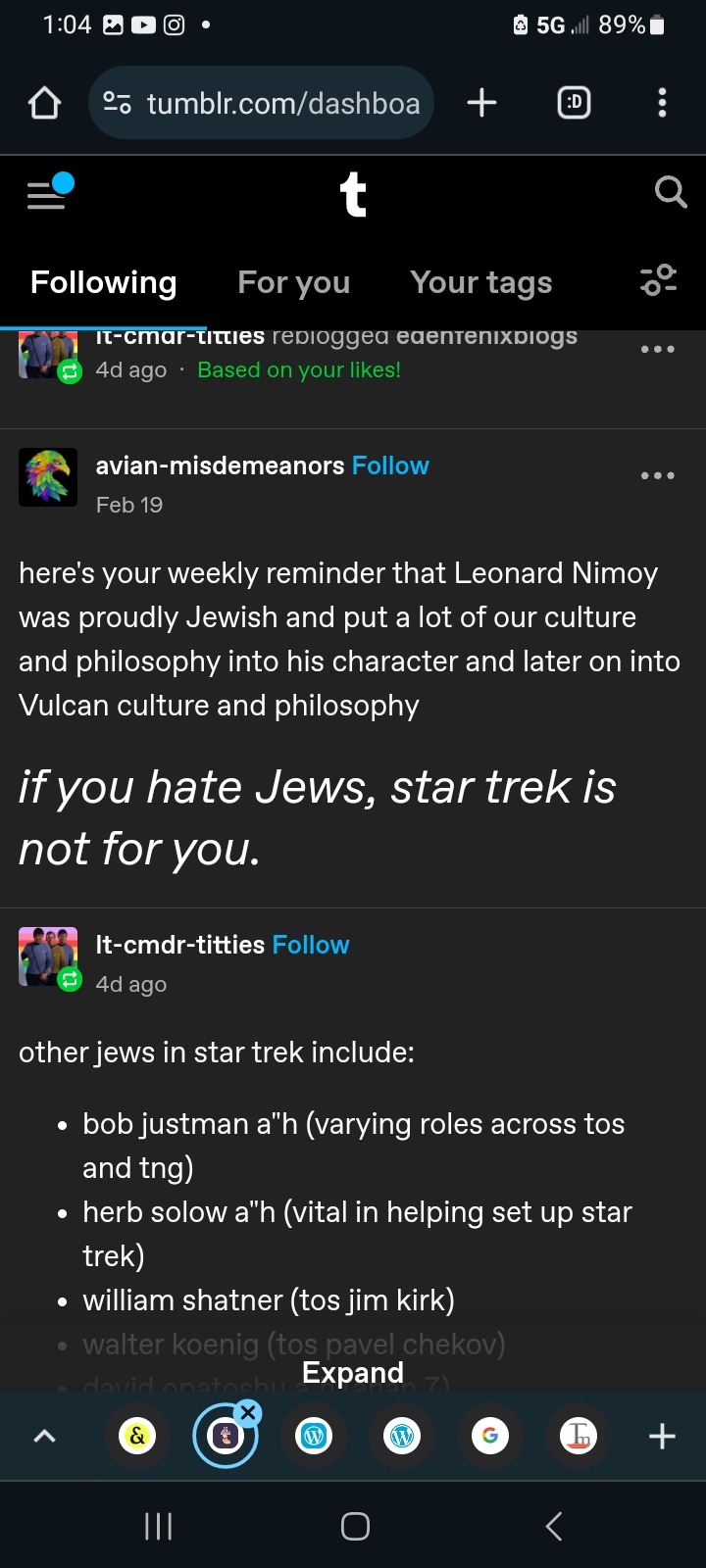
Hm. I have dealt with antisemitic star trek fans, but given the times we live in and the recency of this post, as well as me not hearing of any recent major events about antisemitism in Trek fandom, let me check OPs blog real quick

Ah.
Anyway- DS9 intentionally paralleled the Occupation of Bajor with both the Holocaust and the Nakba, among other things, and one of the cast members who remarked on the similarity of Bajorans to Palestinians was Armin Shimerman, who is himself Jewish.
#cipher talk#Star Trek has an ambivalent relationship to Judaism imo honestly#It is true that Nimoy put a lot of Judaism into Spock#But uh. The Ferengi. Who are not only coded in ways that relate to Jews but also Chinese people and Muslims#Even with the complexity added to the Ferengi- notably by Shimerman and other DS9 cast members- its still an ambivalent depiction#Like. A lot of the complexity was added by individual Ferengi being at odds with their culture and accepting Federation ideas#Which I think speaks to how a lot of the Jewish writers and actors on DS9 aren't religious and how secular American Jews#Often regard religious American Jews- especially Orthodox Jews. Which I've already said I feel impacted how Kai Winn was portrayed#(Specifically the choice to associate the word 'Orthodox' with terrorism and assassination)#and how an ambivalent view of religion- sometimes leaning negative- also furthers this view of Judaism
27 notes
·
View notes
Note
hi!! would you kindly tell us the comics you used for your passionate defense of martians' gender fuckery?? i would very much like to read more!
Haha sure! J'onn and the Martians are a case of "they're genderqueer coded through science fiction shenanigans but because they don't have the constraints to be Representation they get to be really fun and interesting in a way most Corporate Canon Representation don't get to be". With that, here's the comics I pulled from for queer readings of J'onn and the Martians:
Justice League Infinity Takes place in the DCAU world, where J'onn takes a break from the League to live a quiet life as Amrit Jessawalia. This one's cute, I like it- and the writing feels really intentional that it's meant to be a queer reading of J'onn as it's written very compassionately.
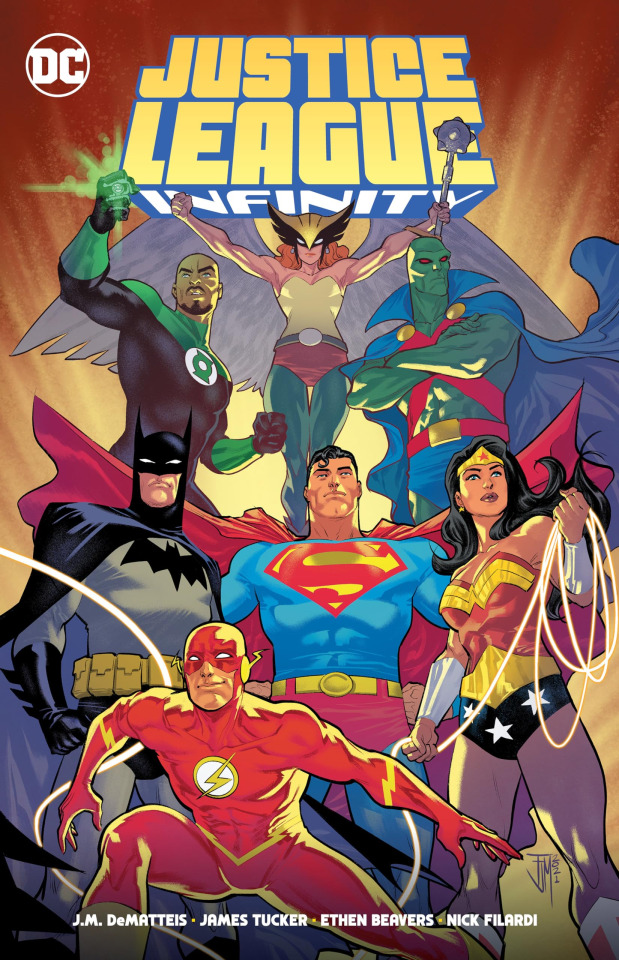
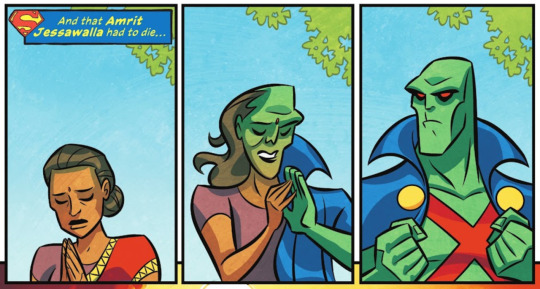
New 52 Martian Manhunter Solo: Epiphany The great Monkey's Paw of J'onn Queer Texts. The New 52 Solo is unintentionally the gayest and genderfunky story of all time for J'onn, at the expense of being extremely convoluted and edgy. It's about J'onn splitting himself into multiple identities to escape death, and all those identities need to unite in order to become J'onn again. This is where J'onn kisses Aquaman, and his heart is represented by a woman. This story is so queer that is spawned this write up on Screen Rant about it.
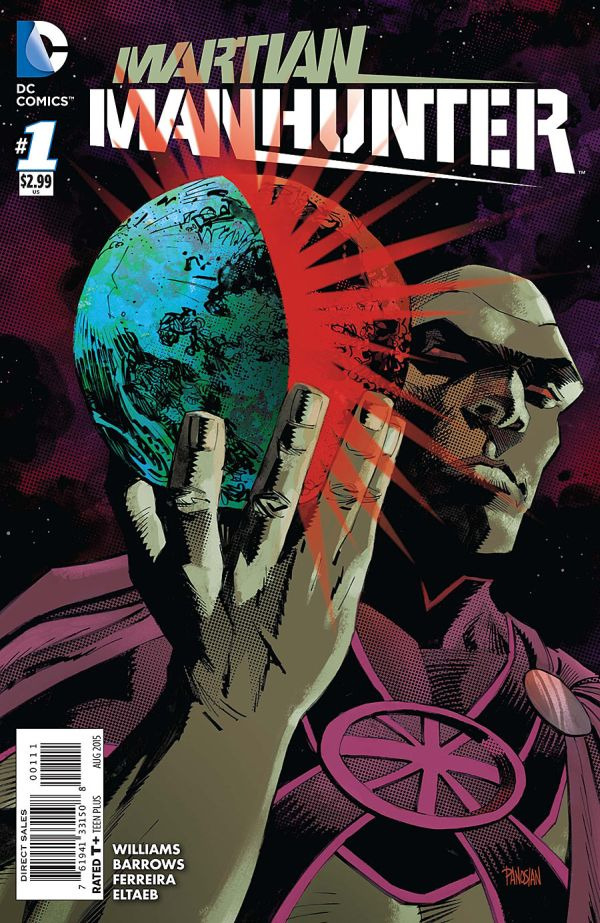
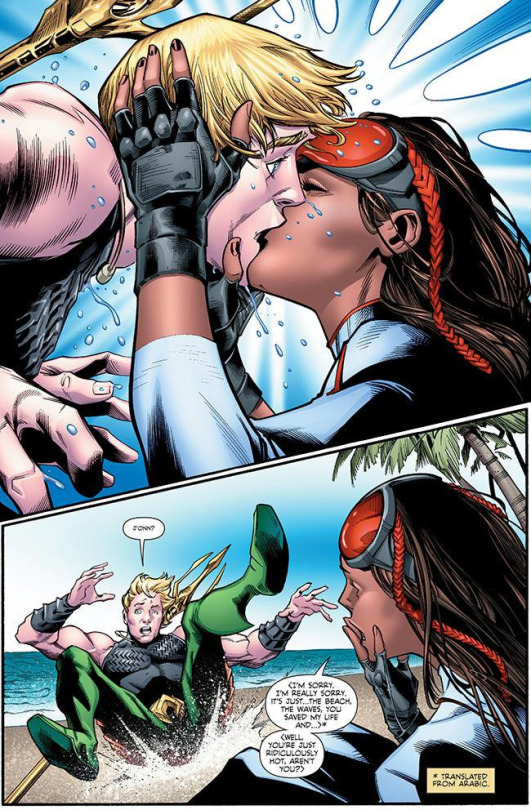
Martian Manhunter 2019: Identity While this solo is polarizing in the MM community, I still recommend it because it has a lot of merits as a J'onn take. This is written by Steve Orlando, a Jewish bi man who purposefully integrated his Jewish heritage and queer identity into his reimagining of Martian lore. While J'onn isn't technically queer in this story, his narrative is paralleled with that of a bi woman (a cop, barf. Very copaganda run unfortunately), and Martian lore is reimagined as nods to Jewish culture and customs (which is incredibly cool). Martian shapeshifting culture is more thought out in this run, down to Martian pro-creation/pregnancy being a thing both J'onn and his wife M'yri'ah combined do together. This is the most explicitly intentional J'onn queer allegory I've read so far.
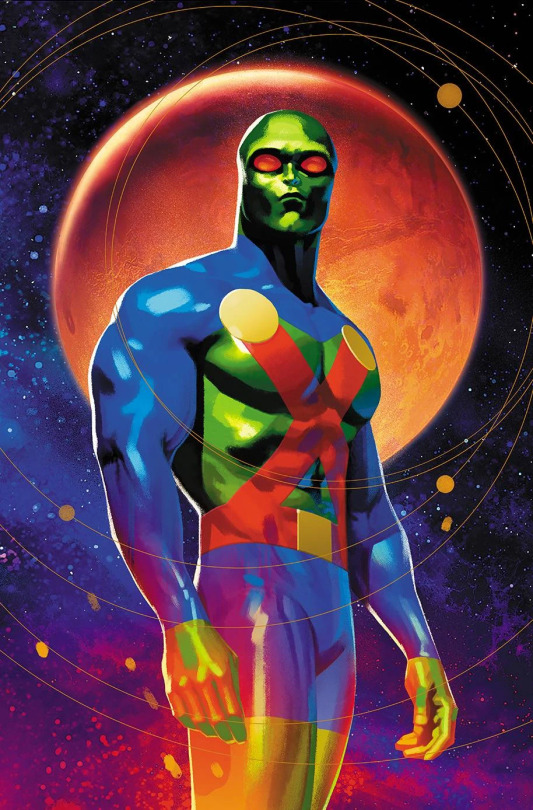
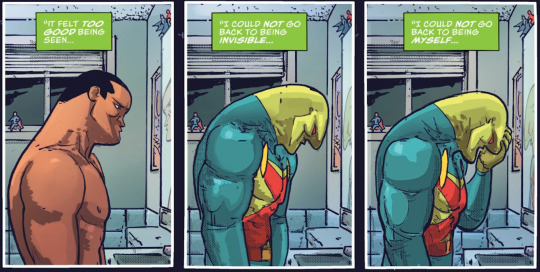
JLA 1997 issue 63 This is where the iconic "J'onn identifies as asexual" panel comes from. It's real!! Definitely unintentional representation moment but I think it's funny that this canonized J'onn as "not a cis man" just because the writer wanted to avoid Diana calling out J'onn for being sexist lmao
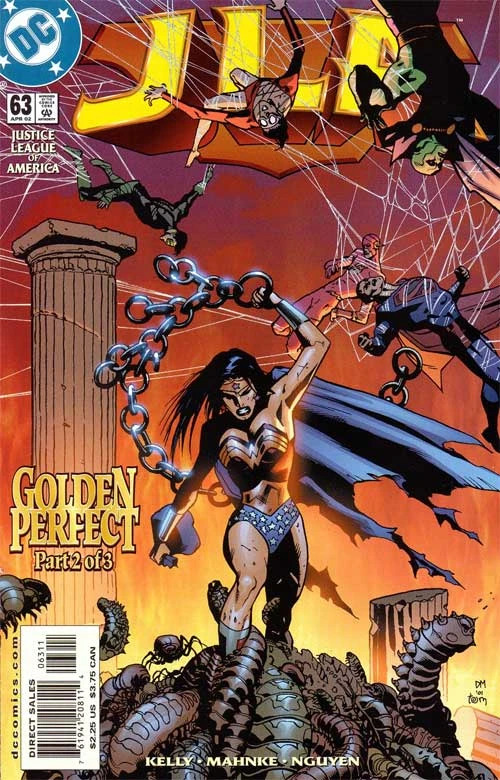
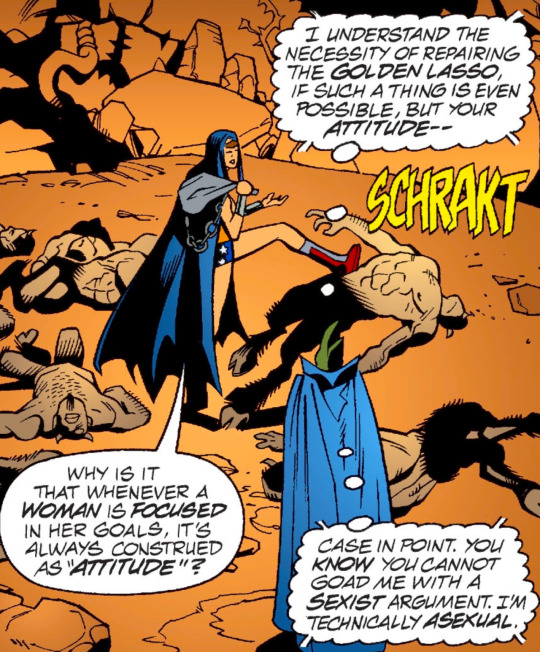
Carl Lumbly's Interview with Watchtower Database Highly recommend this interview because not only is it rare to hear from Carl Lumbly (the beloved voice actor behind DCAU J'onn) but he speaks in a way that's so profoundly poetic, it's clear J'onn is a character that personally means a lot to him. His headcanon for Martian shapeshifting culture is my favorite of all time, and I love how his take in particular respects the identities J'onn shifts into (maybe I'm making a comic inspired by his take because it's that good). He talks about how he informed J'onn's characterization with his immigrant experience, which I adore as well. My hot take is that Black actors have contributed the most interesting and nuanced takes on J'onn :y
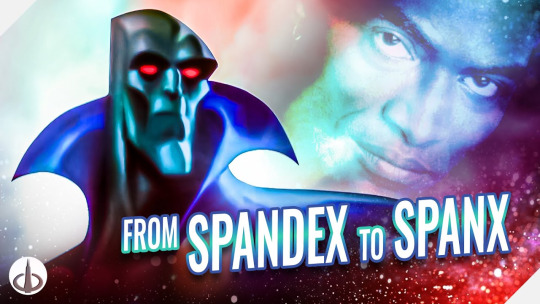
Those are the big holy grail of Queer Martian texts (minus the really cringey transphobic Joan J'onzz story)! The rest is me reading into/projecting onto other Martian characters which is incredibly easy to do when they're a shapeshifter alien species that swap into men and women casually, haha.
#askjesncin#martian manhunter#jesncin dc meta#whenever ppl want queer Supes I keep standing there being like. J'onn is right here guys. we have gay and trans Supes already#always got J'onn gender receipts at the ready
38 notes
·
View notes
Note
Hi Imp!
Sorry, I wasn’t sure which of your tumblr pages to ask you the following (let me know if there’s a specific one you’d like me to use in the future).
Could you pls share your opinion on F4’s Ben Grimm, if you have one? In general and his portrayal in the movies? Are you also looking forward to the upcoming F4 movie?
I came across a fantastic four Instagram page with a scan from a comic where Ben was almost asking Johnny if Reed might be able to come up with something to help him (trigger warning — !!!!) *check out* and I thought, “wow! I don’t know much about Ben” then, I remembered how well versed you were in a number of Marvel related subjects (and the care you took re: understanding the mental health of your faves), and wanted to please come to you!
(I also remembered how much you respected my forever lady, Ororo🌟🙌🏾🌟 but that’s an aside lol)
Hello! Thanks for the question, and I usually answer questions on my main @imperiuswrecked but that is currently off due to me having a backlog of questions to answer and I'm very busy with getting things done for fandom weeks/blogs that need to be updated. I will open again in the future. I kept this blog open just for Namor questions, but I wanted to reply to yours:
(Love Ororo, my queen!!!)
TW: Self harm, suicidal thoughts/words
To answer your question, the reason why Ben asks to find a way to commit suicide is because Ben does suffer from depression in the comics, a lot of it has to do with his powers/how he was transformed, basically he got the worst of the lot, and he has a lot of negative self image issues, he feels dehumanized a lot, and at some point doesn't see the point in going on. One of Ben's major recurring character themes is how dehumanized he feels, how Reed's guilt over what happened to Ben will never let Reed rest until he finds a cure for his best friend, of Ben's resentment to Reed, but also the fact that he loves Reed as a friend and so its very complex in that he hates and loves. That's for like the main comics, but I do think the you're asking about the Ultimate comic since you mentioned his conversation with Johnny? Ben had gotten to the point where he felt like Reed wasn't trying anymore and he feels like he has no way out. The Ultimates line isn't the 616, it was supposed to be a "more grounded" comic so they emphasized on self harm thoughts in this comic.
I am speaking in reference to the comic: Ultimate Fantastic Four (2004) #27
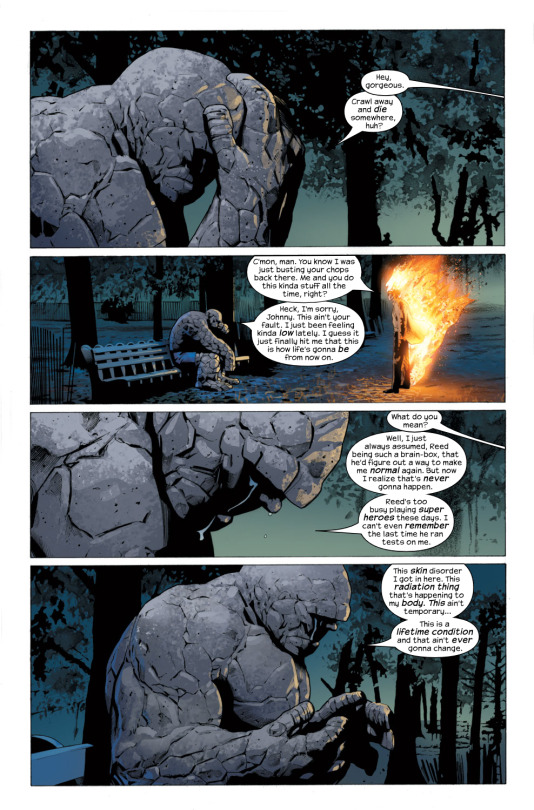
My opinion on the 616 Ben Grimm is that I love him, he's a great character, very fun to read and very heartbreaking when it gets heavy. I feel like Ben is the heart of the team, and he has to deal with his self image issues a lot, and a lot of his mental health issues are about his body dysmorphia/how he feels he looks ugly and thinks he is unlovable. His arcs usually run on a cycle where he comes to a point where he accepts who he is just enough to be able to go out and save the day or live his life, but then eventually falls back into a depression, it really depends on which writer has him, some just want him to have a good time, but others bring back his issues/the angst etc. Sometimes Ben does get his human form back but it never lasts.
Ben's past movie portrayals were ok, I guess? I'm not quite the expert in all F4 stuff, but like typical movie stuff you'd except from the eras they were made in with very little to no effort to be inclusive of Ben's Jewish background, but I'm glad he finally has a Jewish actor to play him in the upcoming movie since the character is Jewish and only one movie made a reference to that Fant4stic I think with a background prop, but the actor of that movie wasn't Jewish iirc. Hopefully the new upcoming movie does well by his characterization.
I really love Namor and Ben in the comics and I sorta wish we could get something like their characterization in the Fantastic Four novel: To Free Atlantis in which they connect over how they are viewed by others. Ben is shocked to learn that Namor is hated for his physical appearance because he's a handsome prince, not knowing that under the sea, Namor is despised for being half human, so he thought Namor would have it easier than a Thing like him, and Namor points out how lucky Ben is to be surrounded by love.

Ben and Namor don't really have heart to hearts in the comics, they are mostly fighting, but sometimes we get cute gems like Ben and Namor at T'Challa's bachelor party

10 notes
·
View notes
Text
A Quick Note on 'Jewface', Maestro and Oppenheimer
Given that my presence on this platform is filtered specifically through the lens of Jewishness in film, and that I wrote my undergraduate dissertation on the Jewish identity of Leonard Bernstein – the subject of Bradley Cooper’s controversial upcoming film, Maestro – I thought I’d weigh in on the current discourse.
For those who are unaware, one of the biggest films due to premier as part of this year’s autumn film festival season is Bradley Cooper’s Maestro. The film is said to be a non-traditional biopic of 20th century American composer Leonard Bernstein, focusing largely on his complex relationship with his wife, Felicia Montealegre. Controversy has arisen around the Netflix production due to images from the trailer featuring Bradley Cooper as Bernstein wearing an enlarged prosthetic nose. Voices within and outside Jewish communities have loudly criticised Cooper for caricaturing Jewishness, using the term ‘Jewface’ which describes the act of a goyische (non-Jewish) actor using prosthetics to make themselves look more like a cartoonish, imagined Jew.
While it is true that Bernstein did own a decent sized schnoz, the prosthetic utilised by Cooper is significantly bigger, and more defined than the nose was in reality. From a personal standpoint, I do find the use of this prosthetic to be pretty discomforting, but I think it speaks more to Cooper’s insecurity about the size of his own nose, which is a lot bigger than perhaps he would like to admit (and not too dissimilar to Bernstein’s actual nose!), than it does about his perception of Jews. That being said whether it was his intention to cartoonify Jewishness or not, Cooper has ruffled feathers in a way that is crass rather than substantive. Bernstein’s living relatives have come out in support of Cooper and his decision to use the prosthetic, saying that Bernstein would not have minded, but I think their statement rather misses the point. The nose is not about Bernstein himself, but about highly visible representations of a tiny minority that are stereotypical and incredibly reductive.
Funnily enough, however, Cooper’s use of ‘Jewface’ is the element of Maestro that bothers me the least. I have been fairly vocal since the film’s announcement about how I believe the production as a whole to be a pretty catastrophically bad idea. Leonard Bernstein is my number one creative hero – as a composer, public intellectual and educator, I don’t think there has been a single Jewish figure in American history who has had more of a positive impact on culture.
As I mentioned, I have written extensively about Bernstein in an academic context, and in researching him, it became clear to me just how vitally important his Jewish identity was to him throughout his life. It informed his music (even West Side Story, which was initially conceived as a story about Jews and Catholics on the Lower East Side of Manhattan), and his role as an educator (he often described his pedagogy as rabbinic in nature), and he was deeply, foundationally affected upon learning about the realities of the Holocaust which caused what he described as ‘aporia’, a state of being where he was too overwhelmed to write a single word for years. Bernstein’s complicated relationship to sexuality was also hugely significant in his life. There is still debate to this day about whether, given an open, accepting environment, he would have identified as a gay man or as bisexual. He had significant, passionate relationships with both men and women, and was an early major advocate for HIV/AIDS research.
My problem with Maestro is that I don’t have faith in Bradley Cooper as a writer/director, to sensitively depict these two massive aspects of Bernstein’s identity. Focusing on his most significant straight-passing relationship as the centre of a film called Maestro does not inspire confidence that the film won’t totally whitewash Bernstein’s Jewishness, or reduce his sexuality to the pain it caused his wife (in a similar way to other reductive music biopics like Bohemian Rhapsody or Rocketman). Cooper’s own identity is significant in that he is starting from a place of remove from the identity of his subject, which isn’t necessarily a dealbreaker, but when there are other filmmakers out there who are far better suited to a project like this, both from an identity perspective and a thematic one, it’s hard to justify why this project exists at all in its current form.
Some have pointed to the involvement of Steven Spielberg as a producer on the project as hope for better representation, but given that Cooper and Martin Scorsese – a filmmaker who I have criticised in the past for the didactic, Christian morality of his movies – are also credited producers, I don’t think it’ll make much difference. I’m more comforted by the involvement of Josh Singer (Spotlight, The Post) and his contribution to the screenplay, given his Jewishness and his work on thematically sensitive historical films.
I’m not writing off the film entirely just yet. I had similar worries about Oppenheimer, given the significance of the scientist’s Jewishness in his decision to start work on the bomb in the first place. Nolan and Cillian Murphy, thankfully, proved me wrong in the director’s decision to focus on the differing Jewish identities of Oppenheimer, Lewis Strauss, and I.I. Rabi, and the nuanced ways in which their characters were informed by Jewishness, as well as Murphy’s attention to detail in his performance. It’s certainly possible for non-Jewish filmmakers to consider Jewishness in a valuable way (see Todd Field’s Tar or Paul Thomas Anderson’s Licorice Pizza for a couple of recent examples), but the set-up of this project makes it hard for me to believe that Cooper is one such filmmaker.
To end with a little self-gratifying what-if, I thought I’d lay out what would be my ideal Bernstein biopic: a film centred around the relationship between Bernstein and his fellow queer, Jewish composer and mentor, Aaron Copland, the letters they wrote to one another, and the fallout of their brushes with McCarthyism which had vastly different outcomes. I would keep Cooper as Bernstein (without the prosthetics!) because he can convincingly play the man’s charm, I’d cast Michael Stuhlbarg as Copland, and get Todd Haynes to write and direct. Haynes is Jewish, gay, and has a great deal of experience directing sweeping, romantic, dark, and political films. He knows how to portray music on screen and has several masterful period-pieces under his belt, with Carol in particular as a shining example of complex, historical queer romance in America. Honestly, this would be my dream film project.
#blu ray#blu ray collector#blusforjews#cinema#cinephile#film#film tumblr#jewishness#jewishness in film#maestro#leonard bernstein#bradley cooper#jewface#antisemitism#oppenheimer#christopher nolan#todd haynes#michael stuhlbarg#aaron copland#biopic#music biopic#queerness#queer history#gay#bisexuality#lgbt representation
53 notes
·
View notes
Text
Tldr: Janine and Egon have a beautiful and rare Jewish love story that was ahead of its time. Thank you fellow shippers for helping to celebrate this.
“Some artists argue that making light of prejudice, or turning purveyors of it into absurdities, robs hatred of power. I’ve been persuaded by that idea, and like many secular types, a Jewish sense of humor is more integral to my identity than any religious observance. It’s also a source of pride. A resilient comic sensibility that finds joy in dark places is one of the greatest Jewish legacies — as is an ability to laugh at ourselves.”
“When a gentile plays a Jew, the results are often more affected, the mannerisms pronounced, which can often mean the difference between someone playing Jewish vs. inhabiting a Jewish character…”
“I never questioned the idea that Jews had been well represented in popular culture until I read Jeremy Dauber’s book “Jewish Comedy: A Serious History” and learned that not one leading character on prime-time television clearly identified as Jewish from 1954 to 1972 and again from 1978 to 1987.”
“How much did it matter that as a boy I saw no Jewish couples on television? I’m not certain — draw your own conclusions about the fact that I married a non-Jew.”
This essay captures a key part of what I adore about the Egon-Janine ship: two Jewish characters getting a chance to be together. And mainstream people dig it!! Like the author, I was a Jewish child who hardly saw this depicted in TV and film.
I think many people don’t realize that Egon and Janine are Jewish, because they don’t look like caricatures of Jewish people that you often see in media. Especially caricatures delivered for laughs. This is the difference between ‘playing Jewish’ aka being over the top versus ‘inhabiting’ a Jewish role.
Janine’s surname, Melnitz, suggests an Ashkenazi (European) Jewish background. Many Polish, Russian, and other Slavic Jewish surnames end in “-itz.” (Think Manischewitz, Saffitz, Wolowitz, etc.) Janine is sassy fashionista, like a Brooklyn-born predecessor to Fran Drescher in The Nanny. Some online articles say that J. Michael Straczynski, a leading writer for The Real Ghostbusters series, even confirmed that Janine is Jewish.
Egon as played by Harold Ramis epitomizes a culturally Jewish character who isn’t acting like an exaggerated Jewish person. Ramis played A LOT of subtly Jewish roles, including: Moe Green in SCTV, Russell Ziskey in Stripes, Steven Buchner in Baby Boom, Harris Stone in Knocked Up, etc. He even played a Hasidic record producer who speaks Yiddish in the 2007 movie Walk Hard.
Ramis spoke at length in many interviews and speeches about how Jewish comedic traditions shaped his sense of humor. That worldview has more to do with depicting a Jewish character than what many people think it means to be Jewish (‘a very special episode’ when someone celebrates Hanukkah, which by the way is a minor holiday). According to Violet Ramis Stiel, her dad acknowledged the visual change from Egon in the ‘84 movie to The Real Ghostbusters like this: “I think we have a ways to go before we get a hunky Jewish cartoon character.”
Ramis and director Ivan Reitman were both Jewish. Reitman’s mother survived the Auschwitz concentration camp. They contributed a Jewish sensibility to Ghostbusters just as much as other actors and writers brought their own points of view.
All this to say, I rarely saw subtle Jewish characters like Egon and Janine growing up. And when they are on screen, they’re the quirky friend, not the hero or love interest. It’s meaningful to see how many people (especially non Jewish people) adore them as individuals and together. It really warms my heart. Thank you for reading!
#egon spengler#ghostbusters 1984#egon x janine#harold ramis#janine melnitz#ghostbusters#russell ziskey#egon and janine#janegon#judaism#jewish humor
101 notes
·
View notes
Photo
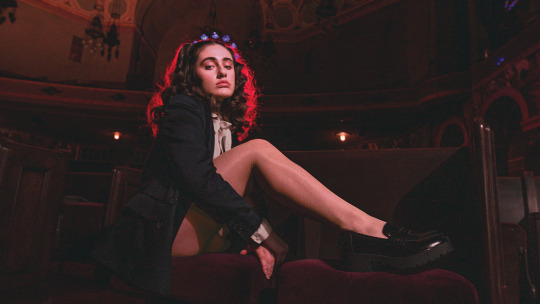
Chaotic Bisexual.
Shiva Baby writer-director Emma Seligman tells Ella Kemp about expanding her wildly cringey short film into an even more anxiety-inducing feature, why Virgo and Taurus make the perfect producing pair, and the eternal conflict of being a good Jewish girl.
“If I can skip a bris to see E.T., I like movies!” —Emma Seligman
It sounds like a strange riff on a guy-walks-into-a-bar joke: a girl walks into a shiva and bumps into her secret ex-girlfriend, then her sugar daddy, then his shiksa wife, oh, and their baby—yet the payoff is so much more rewarding.
Filmmaker Emma Seligman’s debut feature is a new kind of teen classic: 78 non-stop minutes teeming with well-drawn traits and tropes that define the best coming-of-agers, the best Jewish comedies and the best day-in-a-life psychological roller-coasters.
Shiva Baby began as a grad project—a short film of the same name—and Seligman’s feature-length embellishment impressed at last year’s virtual editions of SXSW and TIFF, where it was quickly snapped up for international distribution. In a way, Shiva Baby was perfectly tailored to the times we were living in: Danielle, our reluctant heroine, is trapped in a claustrophobic family event she can’t escape, as people from her past and lies about her future make their way deep under her skin.
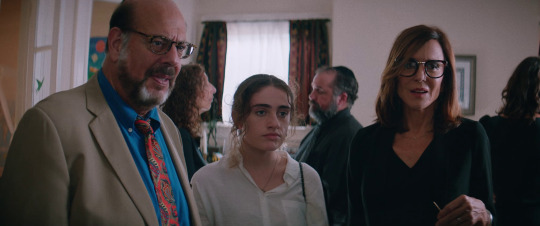
Fred Melamed, Rachel Sennott and Polly Draper in ‘Shiva Baby’.
Shiva Baby is very much the product of a wry school of emerging filmmakers who understand excruciatingly mundane horror and pin-sharp comedy as intimate bedfellows. Seligman’s writing finds a way to flesh out gloriously caricatural Jewish relatives, probing and overbearing and irrational. She does this both through dialogue and a visceral, haptic aesthetic that lurches in and out of focus visually, and has a nails-on-chalkboard unease sonically.
Coming in hot with a 4.01 average rating, Shiva Baby is striking all sorts of discordant notes with film lovers. “Combines some of my biggest anxieties: being asked if I have a boyfriend as well as what my plans for the future are and people talking with their mouths full,” writes Muriel.
The film’s “bisexual chaos”, which hinges on a haywire performance from Rachel Sennott as Danielle, opposite Molly Gordon’s overachieving ex-girlfriend, Maya, is also one of its great strengths. Glee star Dianna Agron is the shiksa threat, Kim, while Danny Deferrari is Danielle’s hapless benefactor, Max. If that’s not enough? Polly Draper, Fred Melamed and Jackie Hoffman are also just there.
What do you think defines a Jewish sense of humor? Emma Seligman: It’s morbid usually, and darker—generally uncomfortable and cringeworthy. I think about Curb Your Enthusiasm or Seinfeld, and A Serious Man. It borders on, “Is this funny at all?” I think Jewish humor leans into the darkly funny British sense of humor. I’m Canadian, so I feel like I’m halfway between the UK and the US in terms of their sense of humor.
Was it always your intention to make a comedy that feels like a bit of a nightmare? You’ve mentioned Black Swan and Opening Night as touchstones… Because I came from a short film, the question when expanding into a feature was, “How are we going to keep everyone interested in this day?” It’s got to be a significant day, it’s got to be that this young woman’s life has completely changed from this day. So what is it that changes? Why are we watching it? I watched a lot of movies that took place in one day, one of them was Trey Edward Shults’ first film Krisha. And then from there I realized that anxiety and this scary psychological feeling is a great way to have the audience stay there.
I watched Opening Night because there’s a shiva in it, but it was more the lobby scenes that were so claustrophobic and tense. And then each step of the way with each department, we were like, okay, it’s gonna be tense, but then we got to music, I was like, okay, this has become a full nightmare. Initially, I was just like, it’s got to be tense, but by the end, I was like, well, it does feel like a nightmare to a young woman sometimes.
Because you mention that, I have to ask whether you’ve seen Bo Burnham’s Eighth Grade? I have, it’s incredible. It’s so funny, they’re both coming-of-age [films], and one of them is about a fourteen year old and then the same sort of feeling exists when you’re 22. When you’re fourteen is when it begins, and when you’re 22 you’re sort of at the end of it and you’re like, “Oh, I thought I figured out what I was supposed to do when I started feeling insecure this way at fourteen about sex and boys.”
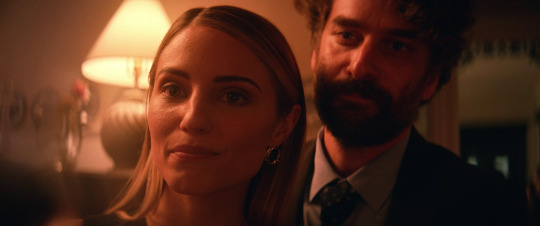
Diana Agron and Danny Deferrari in ‘Shiva Baby’.
Let’s talk about Rachel Sennott, who you have describe as your “Virgo rock”. What do you bring one another in your creative partnership? She’s a hustler, and she sets goals like nobody else. I think she moves very fast, and I’m more detail-oriented. I don’t know if the movie would have happened without her because she was like, “What are the goals to achieve this film?” After we made the short film, she just kept checking in with me. She goes well beyond what an actor does, which is why she’s an executive producer, because she was very, very invested in seeing the movie get made.
I think she pushes. We joke that she brings me out of my depression and I help calm her down. I feel like Taurus is a little more chill. Virgos are also earth signs, but they run on a faster frequency. So I think I calm her down, especially when we’re writing and bringing it back to structure. But she’s way funnier, she’s able to give jokes so quickly. We balance each other perfectly, for sure.
Do you think your partnership with Rachel is the kind of partnership you could see yourself maintaining throughout your career? Definitely. I think it’s important to have a good friend and also a young woman. She’s got different career goals from me, but they’re aligned. And we’re not in competition with each other. I feel so grateful because so much of the time I feel like the world does make you feel like you’re in competition with your friends that are trying to do the same thing as you when you’re a young woman—or just maybe in general.

Rachel Sennott and Danny Deferrari in ‘Shiva Baby’.
Her character in Shiva Baby completely subverts the idea of a “nice Jewish boy/girl” which can be a trope in movies, but also very much a real thing in life. Is that something you consciously wanted to subvert, or did it come organically from the story you wanted to tell? I wanted to contrast that idea of a “nice Jewish girl” because every nice Jewish girl or boy has a sex life. I felt the sort of nice Jewish girl stressors on me were completely opposite from the NYU art school sugaring worlds, and hookup culture broadly. My family is such a huge part of my life and I think that those two sets of pressures are completely contradictory; to be a good girl or boy and have a stable career ahead of you, and to be finding, even if it’s at the very beginning, your eventual partner, or to just be in a relationship. And I felt like in school, no one wanted to date, everyone was hooking up. So many of my friends are sugar babies. I tried it super, super briefly.
I felt like the world was telling me to be like “an empowered, independent, sexy woman who doesn’t care what anyone thinks of her, and doesn’t abide by any rules”, and I was like, “This is the opposite of being a nice Jewish girl!” And I just felt like those two things were screaming at me. So I did want to play on that. But I don’t even think it’s playing, just because that felt like what I was trying to battle within myself. And I think a lot of young people do, whether they’re Jewish or not. That’s their family’s expectations. And then the world is like, “But don’t care and don’t commit…”

Writer-director Emma Seligman. / Photo by Emma McIntyre
But then you still have to go home to your parents at the end of the day and they’re going to tell you what to do… Exactly.
What would you want viewers to take away from Shiva Baby about the sugaring community that you feel has been maligned in the past? I’m not a sex worker, so I don’t want to speak on behalf of this community, but I definitely feel like there hasn’t been many positive portrayals of sex workers. So I just wanted to show someone—because I knew so many friends of mine who did it—who enjoyed it, or purposefully did it and didn’t feel bad or shameful about it. I think maybe a lot of people think that it’s always something that comes out of dire circumstances. But whether that is the case or not, I think there’s a lot of people who enjoy it and enjoy what they do like any other job. So I just hope that they’re able to sort of widen their scope of what a sex worker looks like and acts like. Every sex worker has got a family, friends, a full robust life, as we all do.
It’s time for your Life in Film questionnaire. Can you give me a few must-watch Jewish films for people who don’t know where to start? Fiddler on the Roof, Yentl, Keeping the Faith, Kissing Jessica Stein, A Serious Man. Definitely Uncut Gems, and Crossing Delancey.
Shiva Baby has been described on Letterboxd, variously, as “Uncut Gems but make it chaotic bisexual”, “the most stressful Jewish movie since Uncut Gems”, “the chaotic successor of Uncut Gems”, “if Krisha and Uncut Gems had a baby”, and, of course, “Uncut Gems for hot Jewish sluts”… Amazing, I love that. Extremely nice comparison.
Who is your favorite promising young woman? Not Emerald Fennell’s film, but a young creative or performer who you think is making waves. I love Hari Nef—I think she’s amazing and am really excited to see what she does next. I loved her so much in Transparent and Assassination Nation, and I don’t understand why she hasn’t been the lead in a million movies.

Molly Gordon with Rachel Sennott in ‘Shiva Baby’.
What should people watch next after Shiva Baby? Those Jewish movies would be a great start. And then Krisha, although I think a lot of people have seen it especially if they’re on Letterboxd! But then those Jewish romantic comedies, and then Obvious Child, all those movies are very sweet and endearing and helped me make it.
Separate from film, if it’s shiva-related then Transparent. If I didn’t have Transparent I don’t think I would have seen world of grounded, nuanced Jews that I could do comedy with. It would have been more in the Curb vein, which is also amazing, but a little more schtick.
What was the first film that made you want to be a filmmaker? My parents are huge movie buffs so I’m not sure there was one moment, but I will say that when I was six there was a re-release of the 20-year anniversary of E.T. the Extra-Terrestrial and I was at a horribly packed bris and my uncle was like, “Fuck this, there are so many people here, I can’t even breathe. Let’s go see E.T.” That was the first moment where I was like, if I can skip a bris to see E.T., I like movies.
Related content
From Short to Feature: Rob’s list of 2020 films that made the jump
Jewish Cinema (non-Holocaust): Amelia’s list of films “for when u want to celebrate your heritage but don’t want to have to think all too deeply about the Shoah”
Best Directorial Debuts of 2020: suggested by Letterboxd members, featuring Shiva Baby
Follow Ella on Letterboxd
Shiva Baby is now in select theaters and on VOD in the US. Film stills by Maria Rusche.
#shiva baby#emma seligman#jewish filmmaker#jewish director#directed by women#rachel sennott#jewish film#jewish movie#transparent#uncut gems#hari nef#e.t. the extra terrestrial#obvious child#krisha#trey edward shults
89 notes
·
View notes
Text
My random thoughts about the CU holiday special
-I’m impressed by the restraint they had at not doing as much toilet humor this time. (Though CU using the tooth brush that the boys were using on the toilets was... yeah I don’t want to think about that one).
-Is it me or was there a cat hidden in Mr. Beard’s recliner?
-I think the boys would have loved ‘Home Alone’ or ‘Gremlins’ and then maybe they wouldn’t have fallen under ‘designated heroes’ in the special to change Christmas.
-Look, I know a lot of you like Melvin, but when the whole ‘putting others before yourself’ aesop came into play, I thought it would make more sense if it involved Krupp instead. The boys have already thrown Melvin plenty of bones throughout this series, and it’d be nice if we could balance it out a bit.
-Honestly, Krupp LIKING Christmas was really weird for me. Of ALL the holidays he’d tolerate, its the one he would be the least likely to celebrate. Also, I’d love to know HOW the writers missed the fact that he was Jewish if they know the books so well. (but on the other hand, I’m glad they didn’t do something predictable with him by reusing certain Christmas stories).
-Also, they completely forgot that Heidi exists, which really sucks. I’ve already expressed my frustrations about it in a previous post.
-OH GOD YES FINALLY! Edith exists in the series after all and Todd Grimes confirmed it to jackie-sugarskull! Christ I’ve been waiting for this for so long! I really hope we get more than a cameo from her before the series ends. However I noticed that she wasn’t wearing her gloves this time and her exposed fingers looked normal.... maybe she’s not an alien after all? (time will tell).
-I also love that we see that she does have a life outside the school and is involved with her community by being a caroler. And as someone who has been in choirs for several years, I highly approve it. Also, I’m betting she’s an alto or a mezzo. (If she appears again with a speaking part, I want to hear her sing).
-Ms. Hurd as a ghost made me think of Prof. Binns or whatever his name was from Harry Potter, but I guess she won’t be around next season. So I take it Krupp ISN’T going to look for a new music teacher if its an excuse to cancel the music program?
-Now all we need is for the lunch ladies to leave/die so that Edith can come into the picture....
-I love that Anthrope is so genre savvy that she KNEW Krupp making the boys directors for the pageant was a bad idea and gave him some grief about it. Actually I’m amazed Krupp lacked the foresight to begin with since he SHOULD have known what was going to happen by this point.
-Nice to know Meaner likes Christmas but it would have been funnier if Grace invited him over for Christmas (to Harold’s great horror).
-There was SUCH a missed opportunity to make an actor allusion involving Nat Faxon since he provides additional voice work for the show. If he also voiced one of the elves it would of made a perfect Disenchantment reference.
-It’s so awesome that they got the legendary Jim Cummings on this show and as three different types of Santa at that! I’m sure he had a lot of fun with this. (Though normal!Santa still sounds a lot like Pete from the Mickey Mouse cartoons.)
-Now that I realize it, this special was basically the Nightmare Before Christmas, except no kidnapping or Halloween involved.
-Jacked!Santa was terrifying. The ACTUAL version of Santa we get at the end was much preferable (and I liked that the show did its own design for him instead of something more common).
-As someone who loves Christmas, I appreciated that its regarded as a holiday you can’t mess with, especially when it involves spending time with your family (If it wasn’t for this stupid pandemic then my entire family could get together on Christmas eve like in the past). Though I wonder how the birth of Christ was acknowledged instead in that timeline.
-”Robot CU” was adorable.
-I loved that ‘How the Grinch stole Christmas’ reference near the end. But again, Krupp is the LAST person who’d be involved with such things.
-Santa, if there was something I wanted fro Christmas, it would be to finally end this damn coronavirus pandemic so that everyone can be together for Christmas.
-Called it on the stop motion references!
-I’m not overly excited about how everything was resolved because it involved yet ANOTHER new timeline, but I get why it was for the best.
-So Krupp spent Dec 25.... with the guy. Maybe he’s Pansexual after all?
-speaking of Krupp, since CU was with the boys during the time travel adventure, shouldn’t he have been... I don’t know... weirded out/horrified by the new timeline since it happened without him knowing?
-Nice to know that Bo DOES have parents, though that reveal was amusing.
14 notes
·
View notes
Text
I’ve watched all of the amazon prime show Hunters, and I did enjoy much of it, but there were obviously some parts that were problematic/controversial at best, offensive at worst.
I very much like (most of) the characters, they’re all diverse and have their own backstories, personalities and strengths. I would have liked to see more of Joe and Roxy’s characters/backstories, though we probably will get that in S2. The acting is phenomenal, especially from Logan Lerman. And the action sequences are highly entertaining, particularly the harsh justice dealt towards the nazis. (Although the nazi-torture scenes are often quite brutal and gruesome, which is understandably triggering/upsetting to some viewers.) It’s also notable that almost all of the Jewish characters are played by Jewish actors/actresses, which is an important accomplishment in and of itself. There were scenes that genuinely moved me to tears, particularly Murray and Mindy’s backstory. The cinematic aspects, including emotional invocation and pop culture references, are very well done in places. The show can be funny as well as fun, and then be dramatic and tension-filled a moment later.
However, I have seen many mixed reviews from the Jewish community about this show. Some people praise the show, some are generally on the fence about it, and some have outright condemned it. It’s clear that the show isn’t completely based in historical fact, even if there are characters/scenes/plots that are based on real life people/events. I’m not Jewish myself, but it’s very important to listen to Jewish people’s criticisms on media that depicts them. From what I’ve read, there are legitimate grievances against certain scenes that depict the concentration camps, and some of the cultural aspects that become blurred and/or disregarded (such as languages and ethnicity, among other things.) There are also many people who have disliked that the show seems to play with the trope of “killing monsters makes you a monster”. In my personal opinion, I believe they were trying to lean more into the physical/psychological effects of committing murder/torture, even if it didn’t land at first, but they did seem to end the debate with how the finale ended.
And speaking of the finale, of course there’s the “big twist”, which was downright awful and completely offensive. David Weil, the show’s creator, is Jewish, and I don’t know how much input he had in writing the script or giving the green light to the final draft, but I really hope the finale’s “twist” wasn’t his idea. Hunters has a lot of good scenes/plots/characterization, so it just confuses and angers me that they threw it away for the “twist” to “shock the audience” etc. Yes, it was a shock, but that’s not what was needed. I can think of a dozen different and better ways that that scene could have gone.
All in all, I will watch S2 if and when it comes out, though with a large amount of caution, as well as getting multiple opinions from the Jewish community. There were parts of S1 that I was iffy about, or didn’t understand why they were problematic before reading up on it (as stated before, I’m not Jewish.) I do genuinely find the story interesting and I enjoyed the characters and scenes throughout. But as much as I like about the show, there are many parts that need to be improved upon going forward. I KNOW these writers can do better.
#hunters#hunters amazon prime#hunters amazon#hunters tv show#hunters spoilers#tv shows#jewish#judaism#antisemitism#history#historical fiction#cinemetography#acting#writing#script writing#tv show writing#my review#my opinion#long post
47 notes
·
View notes
Photo
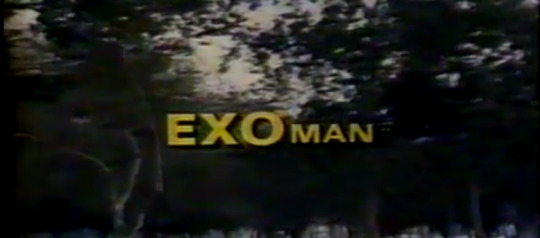
Exo-Man
Failed series pilots were very much part of MST3K’s stock in trade. We’ve sat through San Francisco International, Stranded in Space, Code Name: Diamond Head and I’m sure there were others. I generally recall all of those movies being kind of dull and lacking in personality, and I can’t imagine this 70’s superhero mess being much better. I don’t think anybody in Exo-Man was ever on MST3K but Jose Ferrer (the first Latino actor to win an academy award, for 1950’s Cyrano de Bergerac) was once in a movie called Zoltan, Hound of Dracula, which I am deeply remiss in not having seen yet. You may also recognize Harry Morgan, who was Colonel Potter on M*A*S*H.
Dr. Nick Conrad is a wacky physics professor of the type nobody has ever encountered in real life. He’s somehow both smart enough to invent anti-gravity and memory plastic, and stupid enough to chase after a fleeing would-be bank robber. The latter stunt, set to wakka-chicka Mitchell music, makes Nick the target of a mafia assassin, who kills his lab assistant and leaves Nick himself paralyzed from the waist down. He wallows in self-pity for a while, but then rediscovers his passion for invention and builds himself a suit of armor that will allow him to walk again… and to take on the mob single-handedly.
I don’t know why they called the movie Exo-Man. That name is never used in the dialogue. I guess the more accurate Fiberglass Avenger just wouldn’t have sounded as cool.
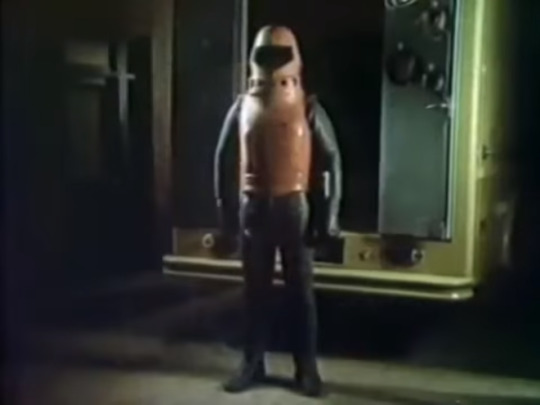
The first thing you’re likely to notice from the plot summary is that Nick’s story starts off as Dr. Strange and then takes a hard left into Iron Man. I’m pretty sure the latter at least was an intentional ripoff, with bits of the first thrown in, knowingly or not, to distance Exo-Man from Marvel’s lawyers. What’s funny is that posterity has actually made it a hat trick: the movie opens with a weirdly homoerotic jogging scene, so now he gets to be Captain America, too!
Exo-Man is a really stupid, often boring, and consistently ugly movie. The actors are mediocre, the music bland, the effects terrible, and stuff is made to look ‘high tech’ by sticking lots of blinky lights on it. Way too much time passes before we get to the action and when we do, we find a deep pit of disappointment. Yet at the same time… I kind of enjoyed it.
A major part of why has got to be the incredibly dopey super-suit the main character wears, which looks less like ‘Iron Man’ and more like ‘Fiberglass Commando Cody’. It moves really slowly and I doubt the guy in the costume can see very much. Nick controls the bottom half of it using switches on one sleeve, which appear to have simple functions like ‘sit’, ‘walk’, and ‘jump’ (there is, of course, no ‘run,’ because nothing happens fast in this movie). He puts the thing on by lying down in what looks like a tanning bed (or maybe one of those contraptions from Avatar). My personal favourite is the warning light labeled malfuntion.
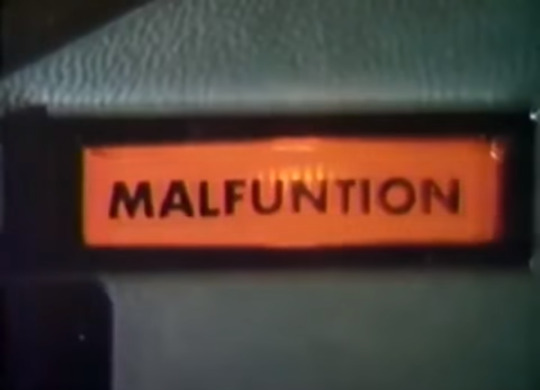
All this is in a movie that sometimes manages to be surprisingly subtle. We are introduced to Nick while jogging, we watch him play tennis with his girlfriend, and see him maintain this exercise regime even while he’s supposed to be under police protection. These shots are in brilliant sunshine, and the camerawork is as active as the subjects. Post-injury, Nick never outwardly complains about his inability to participate in sports, but we now see him sitting in his wheelchair in dark surroundings, with the camera held perfectly still. We feel that he has lost something he loved dearly, and we never need to be told it outright.
We are also introduced to Nick as somebody who is devored to furthering minorities. His two lab assistants are an east Asian student and a Jewish one (the latter identified as such by a surname, rather than appearance), and the reason he was at the bank was to help a Latino student get a loan. Again, the script trusts the audience to get this without having to draw attention to it through dialogue. These minority characters are, of course, still just accessories to Nick’s story. The Jewish guy in particular is there to be fridged – its his death that leads to Nick flaunting his police protection and getting hurt. But the effort was made to say that minority rights are important to Nick, without hitting us over the head with it.
Theme-wise, Exo-Man is about a man coming to terms with a disability. I should preface this by saying that I am not disabled, so my perspective is necessarily biased. If anything I say below is offensive, that is out of ignorance, and please let me know so that I may edit or delete the review and do better next time. I was actually pretty impressed by how the script and director handled the life-changing nature of Nick’s injury… mostly. I’ll start with the bad stuff.
The attack on Nick comes with a heaping helping of victim blaming. As an important witness in the bank robbery, he was offered police protection. The assassin tries to get around this by putting a bomb in his car, but one of the lab assistants borrows the car for a late-night pizza run, and gets killed in Nick’s stead. This leads Nick to deliberately place himself in a vulnerable position, hoping to draw the killer out for capture and punishment. In the hospital with a broken back, Nick blames the police for failing to protect him, but I’m pretty sure the movie wants us to think that this is really Nick’s own fault. Like the tragic accident victims in Days of our Years, he has nobody to blame for his own misery, or that of his loved ones, except himself.
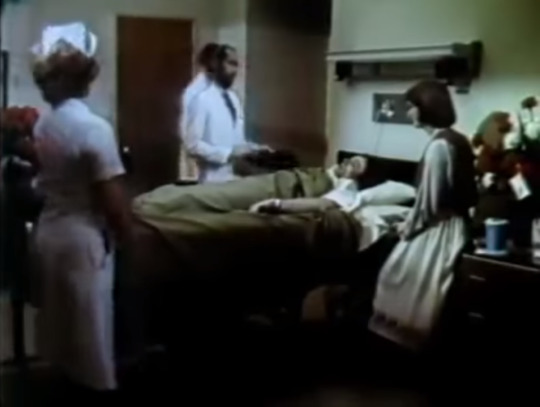
After that, however, the movie’s treatment of Nick’s disability improves quickly. His girlfriend Emily leaves him, but that’s not because he’s in a wheelchair, it’s because he’s too busy wallowing in self-pity to even let her into his apartment. Later when he apologizes to her, she takes him back and they resume their happy relationship, and the fact that they can’t play tennis together anymore is not an issue. She does not treat him as something to be pitied, she speaks to him on his eye level, and they avoid that weird trope of having the abled partner sit in the wheelchair-user’s lap. Emily loves who Nick is, not what he can do. His colleagues and students, likewise, treat him with respect and help him with his chair, and never make the latter feel like a burden.
By the end of the film Nick has come to terms with his disability. The suit he’s built is not a cure for his condition: in fact the first time he wears it out, it breaks down and he needs help getting back to his high-tech armored van. It’s a tool he has built for a purpose, and he doesn’t feel the need to wear it in non-superhero situations. Based on what we see, he could have built a legs-only version to wear under his trousers and let him go jogging and play tennis again, but that is no longer who Nick is. And when and whether to wear the suit is always Nick’s own choice, not something imposed on him from the outside.
Of course, it would also be really helpful in later maintaining Exo-Man’s secret identity, and I suspect the writers were thinking of that a lot more than they were of things like parents forcing questionable ‘cures’ on disabled children. The secret identity probably would have been a big deal if the pilot had sold, but in this stand-alone story, I thought the suit worked well as a metaphor about a disabled man at peace with himself.
Exo-Man also takes a quick little peek at the morality of vigilante justice, although this comes in pretty late and clearly isn’t something they wanted to get into in any detail. The first person Nick confronts in the suit is the assassin who actually beat him up. He says he didn’t go into this encounter with any real plan… perhaps he just wanted to scare the guy. What ultimately happens is that the assassin climbs a drainpipe to get away from the terrifying robot man, the pipe comes off the wall, and the man falls to his death. Nick feels this is his fault, and so the next time he takes the suit out he does so with a particular goal in mind: he wants to capture the mob boss and provide evidence of his wrongdoing to the police, not to kill anyone.
The mob boss’ name, by the way, is Kermit Haas, which is probably the least intimidating name a movie has ever given to its big bad.
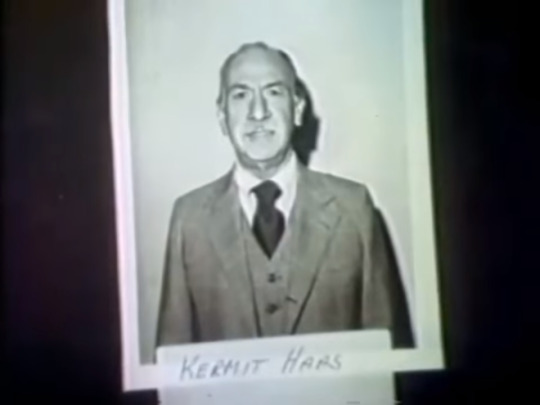
Would that work? Is evidence a guy in a robot suit left in your dumpster for you admissible in court? Isn’t where stuff was found kind of important? I honestly have no idea and I’m not sure how to go about finding out. People might wonder why I want to know and I don’t think saying it’s for my blog would allay their suspicions.
At the end of Exo-Man, I was more entertained than not, but mostly on the level of laughing at the dumb-looking suit and appreciating the fine art of ripping off comic book characters. If that’s your kind of thing then this movie ought to put the fun in malfuntion for you. If that’s not your thing, well… this is an MST3K blog. What are you doing here?
24 notes
·
View notes
Text
June 2: 2x21 Patterns of Force
Took a nap after work today!! Perhaps a bad idea.
Anyway, some thoughts on the... awkward Patterns of Force.
Another story about Jim looking for his hero, I see. That never (always) ends badly.
Definitely getting an image of little Spock (teenage Spock? young adult Spock? all little Spocks) reading about Earth history.
Oh no, an armed drone. That does not bode well. Why do Kirk’s heroes always betray him?
A subcutaneous transponder. That seems like a useful device to introduce into the narrative. (Slash remember for future purposes...)
Also it reminds of me “He’s a...a... a transponster!”
Spock in a hat. I guess the Ekosians and/or Zeons don’t have pointed ears, then.
“It’s our old enemy...fascism.”
Well this guy literally was not subtle in his references to Nazi Germany. (I’m referring in universe to what’s-his-face but this also applies to the episode writer.)
“The evidence is clear... someone did interfere.”
“You look quite well for a man who’s been utterly destroyed, Mr. Spock.” This man canNOT stop flirting for one second.
Lol, using Spock to distract the Nazi.
“It’s logical to pretend to be a Nazi? Okay, I’m convinced. You said the magic word.”
“Look! I captured him!” So proud.
Kirk’s face when Spock says he would make a convincing Nazi. Bb, you’re not doing the compliment thing right. (I’ll actually be quite honest... I find the humor in that moment but it also makes me uncomfortable given both these actors are Jewish.)
That said, Kirk is canonically better at blending into undercover scenarios than Spock is. He thinks better on his feet, creatively.
How do these people NOT recognize two whole-ass aliens.
...Maybe they do.
I do like when Kirk is being interrogated and still tries to be charming..
That Nazi really lost a lot of authority after being dressed down by his superior in front of the captives.
I like this Zeon.
“The flaw in the plan is this locked door.” Thanks Spock. It’s this subtle humor that I think people often miss in him. Like where you can’t tell if it’s intentional or not.
Kirk is so smart!!! He never gets credit for being this smart.
Hmm, taking out the transponders is such a weirdly intimate scene.
The Zeon wants to be included in this adventure so much but they’re obsessed with each other, like “What Zeon?”
“I’ll be your platform, Mr. Spock.”
This is such a weirdly humorous interlude for a story about Nazis. Kind of reminds me in a way of that conversation with the police man on City on the Edge of Forever. I mean that ep was much better but just like the sudden switch in tone.
Spock’s like “Oh, that was cool. Made a laser.”
I heard Kirk say, “You, over there,” as in directing Spock to stand over there, but the subtitles say “Beautiful. Over there.” As in, “we did a beautiful job getting out, now Spock, stand over there.” But combine them...?
Not gonna get a disguise for Spock huh? Just gonna let him be shirtless a little more for no apparent reason.
Poor Zeon. These aliens are inscrutable and not letting him in on anything.
“Alien pistols.”
“Who would win? the entire military force of this planet or two phaser-less space husbands?"
I probably shouldn’t laugh every time Kirk impersonates a Nazi but I do. "Don't mind me... completely believable Nazi here..."
The unsubtle of the Hebrew names. And of course.. .Zeon.
“We’ll be just as bad as the Nazis.” No, actually, you’re not and never will be that’s not how it works. BUT you definitely should help the aliens. Like, that phrase grates because it’s usually used to refer to, like, use of violence, use of “censorship” but here’s it more about turning away people who are different or minority and so then it does make sense but....the connotations.
Spock’s like, “May I... get away from this emotion? Has enough time passed for me to ask that?”
More Nazis! Following them everywhere!
Oh, psych. Not Nazis after all.
Spock’s like “Betraying your own father, you say? I have never thought about that.”
“The Fuhrer... is an alien?” Actual real line AND a correct summation of the situation.
This ep does not paint the Federation in a great light. Although to be fair... John Gill was breaking the rules so.
Documentary corps... I love it. Great disguise. Flash lights in people’s eyes, have an excuse to stay in a group, no on looks at you. Genius.
Spock is honestly so bright-eyed and bushy-tailed about EVERYTHING. He cannot be tamed. Again, really an aspect of him I miss in the reboots.
Kirk really is the captain of everyone in his vicinity.
“Think positively, Spock.”
Uhura is unflappable. “A Nazi Colonel’s uniform? Of course, Captain.”
Send him down naked if you have to!! Yes, please, send him down naked.
Spock giving McCoy detailed instructions on how to put on boots... Why was dialogue like this not in the reboots?
McCoy is so polite. Polite first, confused later. “Nice to meet you, Nazi--wait, Nazi???”
I love how McCoy immediately put on his drunk face and Spock was like, "An opportunity to insult McCoy?? Awesome.”
So I assumed the Chairman was either dumb or didn’t recognize them with their shirts on but apparently he was yet another mole, so. At least it’s not a plot hole.
“The speech has no discernible pattern or logic.” Hmmm, I wonder what it feels like to have a leader who speaks with no discernible pattern or logic?
Guys. Pals. Awful people. Did he really give orders, or did he just say random shit? People will flock to anything. I'll be honest, I actually think this is one of the subtler and better parts of this episode: how chilling it is to contemplate how people will rally around any non-speech that has the right tone and a few key words. This is garbage language. But it incites people to kill.
McCoy and his stimulants again.
Spock and his mind probing again.
Wow Spock really messed with his mind there. “He can answer questions but not otherwise speak?” What kind of crazy shit is that?
They are being so mean to Spock. “Malformed ears.” “Low forehead.” That’s not a low forehead, that’s bangs.
Nice triumivirate scene at the end. Feels good, feels organic. Kirk likes to hear his two BFFs bickering because it feels like all is right with the universe, and I agree. Nature is healing.
This episode has a very weird (and very hard to swallow imo) backstory. Like, who primarily associates the Nazis with efficiency? And even if you do, if you think there’s something to the way they put together the country so fast post-WWI, all of this “efficiency” is directly tied to hatred and violence. Like Isak said, the Ekosians have nothing to hold them together BUT hating Zeons. That's at the center of the design. It's not like Gill’s plan backfired it was just... a horrible plan?? It doesn’t even make sense to me that his “effective regime” was co-opted by one hateful person because what was at the center of the “Nazi” regime before the hatred of Zeons? What could it have been? There are no other alternatives provided. Also, even if it could have been somehow accomplished without the use of a scapegoat.. is fascism really an ideal? Like the story never reckoned with that concept at all, which I find disturbing.
Here’s the thing about Gill. He is a certain real type and I appreciate his inclusion up to a point. He’s the Naive, Hubristic Intellectual. He thinks because he’s studied something, academically, he knows more about it even than people who experienced it, and he can fix all of its problems. “I can do this, but better. I am so smart, I am so well-informed, I have no flaws.” I can even see this sort of person being someone a young Kirk would admire because there’s an optimism and idealism to this naivete. I don’t think Kirk is arrogant but he is very idealistic, and when he was a young man, still in the market for heroes, or at least idols or mentors? Yeah, someone with that kind of attitude toward life--that we can deeply understand and then improve upon history--would have appealed to him. It’s possible that Gill even was the “compassionate, gentle” person that Kirk thought, or that he had that side to him.
Where I think the episode erred is in absolving Gill of most of his guilt for this state of affairs. He does die and he does admit he was wrong, but his biggest sin is allegedly in introducing a regime that could be co-opted for evil rather than one that was inherently bad. He is literally drugged (tortured in a way), to emphasize just how non-culpable the narrative thinks he is. Also, while he does apologize for interfering at all, even this is fairly brief and not expanded upon in the rest of the narrative. The truth is he shouldn’t have interfered in general, because that’s not his place or his right, and he shouldn’t have interfered in this way specifically. Even if Malakon hadn’t risen and taken over, the ideal Gil was imposing was one of unthinking uniformity, lack of autonomy, worship of a leader over the rule law--these are not the values of the Federation, the show Star Trek, or me. But he’s used more as a device to explain why the show is so unsubtly Nazi, rather than a real villain or object lesson. Even though Gill is a much better object lesson than Malakon.
And what about Malakon? The ending presents him, literally and in so many words, as the “one evil man” responsible for all of this. I think we know both from studying history and, unfortunately, from our own times, that this is untrue because impossible. One evil person is just a lunatic ranting on the street corner. One evil leader became leader because others agreed and gave him power, or agreed in part, or made a deal with the devil, or disagreed but said nothing, or spoke but were overwhelmed. It’s a disservice to the subject matter to say that dictatorships or authoritarian regimes are that simple. I get that the episode is only 50 minutes and it needs to wrap up, and it’s simpler to say “Okay, killed the Villain, now we can go back to being Not Evil, all the Ekosians will be as happy as the Zeons because we never really wanted this.” But Hitler and his henchmen weren’t the only Nazis. Regular people--and in this context, regular Ekosians--weren’t Nazis too.
Overall, the episode was okay. Very awkward though. Very blunt. I think it would have been better off not using the Nazi symbology so literally. Like the idea that a human would come into a society and purposefully create something from our history is interesting (and “what if Earth but alien?” is certainly something TOS likes doing and finds various ways to do--like the gangsters in A Piece of the Action or Neo-Rome in Bread and Circuses or even literal Greek Gods in Who Mourns for Adonais?) but not worth it given which society was being emulated. It seemed to be too much an excuse to dig out the old WWII movie costumes (and put Jewish actors in Nazi regalia which... is very... distressing) and not so much an excuse for some kind of commentary along the lines of what I said above re: the hubris of historians, the hubris of time. That aspect leaves a bad taste. It had some good ideas but I think, again, it was hindered rather than helped by how literal it insisted (for some reason) on being. Compare it to A Private Little War, which was just about as obvious a Vietnam allegory as you can get, and yet still didn’t literally transport anyone to Vietnam, and this ep looks all the more clunky. I’m probably judging it more harshly than I have on previous viewings, but I really feel like... you can use sci fi to make a commentary on the rise of authoritarianism, but the delicacy of the subject matter requires you to be particularly thoughtful in the way you do it and the actual statements you’re making.
Anyway, the Enterprise Defeats Nazis is a good episode summary at least.
I think in my last attempt at a whole rewatch I stopped at around this point. I seem to have watched the next two episodes, according to Amazon, but I have a weird feeling I only watched one, the next one, By Any Other Name, and then stopped. I don’t remember either of them so we’ll see how that goes! Will they seem familiar or not?
1 note
·
View note
Text
GRAFIC LUCY
April 26, 1953

On April 26, 1953, Lucille Ball appeared on the cover of the Chicago Sunday Tribune’s Grafic Magazine. Inside, the article is titled “Lucille and Desi. $8,000,000 TV Stars” by Hedda Hopper.
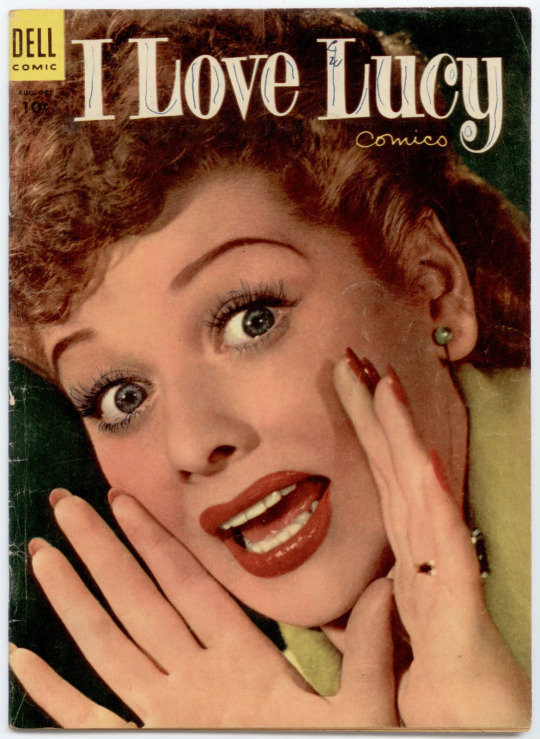
The photo on the cover is very similar to one that also appeared on this 1954 issue of Dell’s “I Love Lucy” comics. It is likely the phots were taken at the same time during the same photo shoot.

By HEDDA HOPPER
LUCILLE BALL, and Desi Arnaz. in their wildest dreams during their upsies and downsies, never imagined that one day they - a couple of strolling players - would be signed to a two-and-a-half year television contract for $8,000,000.
That's a heap of cash in any man's language, and in American money it's like finding the Glory Hole gold mine or stubbing your toe in your own back yard and starting an oil gusher. For actors to sign that kind of contract it's a Disney fantasy come to life.
Lucy has used a lot of gold dust in her hair, but she's certain now that Peter Pan came to life and covered her from head to toe with pixie dust. But, being Lucy, her one comment after signing the fabulous deal with her TV sponsors was: "It couldn't happen to a nicer pair of kids. I mean our two children, of course."
And those kids are as famous as their ma and pa. All over America last January, second in news importance to Ike Eisenhower's inauguration, was the birth of Lucille Ball's baby boy. The interest in the big event was fantastic. Tho they've been kicking around Hollywood for a long time, Lucille and Desi have grown into an American Institution in two years via TV. They've received more than fifty awards; their names have become household words.
I was In Washington for the in inauguration, when Desidero [sp] Arnaz was born.
I’d like to straighten out one point. Lucy didn't have her baby by caesarean to please her sponsors. The operation was necessary. She had her first child by the same process, and since the caesarean operation could be set for a definite date, the birth was worked into the script of the show. The writers took full advantage of it. Since the show deals with an average couple, the pre-natal period reflected that of millions who have, or were having, babies. And to make sure that nothing in poor taste crept in, the Amazes had a Catholic priest a Jewish rabbi, and a Protestant minister check each script.
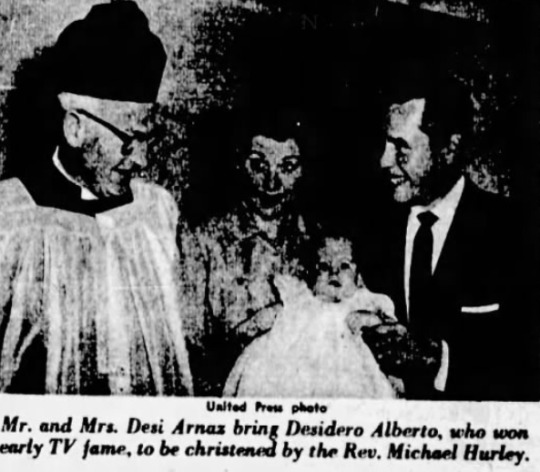
Lucy wanted a boy, and her doctor told her she'd have one. "I didn't pay any attention to his prediction," says Lucy. "He told me my first baby would be a boy, too. So I had a girl."
Their show sticks to real life situations and mirrors the trials, tribulations, and fun of marriages enjoyed by millions of average men and women.
Desi credits the success of the show to that fact "Its an average love story with humor," he explains. "Audiences believe I'm in love with Lucy, and I am. Lucy ' could be a straight dramatic show. In fact, I think there's no really good comedy that couldn't be turned into drama. I believe the average man gets a kick out of Ricky (the name he uses on the show), because he somehow always manages to dominate the woman, tho the victory is not great. Women love Lucy since she gets by with things they'd like to do, but wouldn't dare try."
A fan wrote Desi: "I used to think my wife was crazy. But after following Lucy, I'm convinced all women are that way, so I'm reconciled to my wife's behavior."
Desi is proud of the fact that he and Lucy help many couples in distress. “Lucille and I used to fight a lot," says he. "Then we discovered a sense of humor about situations that came up at home. We learned to live together and like it just as Ricky and Lucy do on the show. In real life, we still have our differences, but we never go to bed without speaking. We may have a peeve between us, but one of us will always say, 'All right What are you mad about? ' That either settles It or starts a real battle, which gets the beef off our chests."
I wanted to know how much Lucy and Ricky resembled the real life Amazes.
"A lot" Desi laughed. "For example, we can never agree on the temperature of our home. I like it hot Lucy wants it cold. We put that In the show. For television the characters have to be exaggerated for the sake of comedy. But sometimes situations come up at home that give our writers ideas. For instance, our baby. Writing him into the script was completely natural. We knew what happened to couples expecting a baby."
“It was the first nine-months' pregnancy that lasted only seven weeks," said Lucy, meaning that the baby business was only on seven programs.
“And neither of our writers, Madeline Pugh and Bob Carroll Jr., is married," said Desi.
"But they know whereof they write," said Lucy. "Within three weeks after the baby was born, we received 20,000 letters, 2,000 telegrams, and hundreds of packages.”
"How many products do you indorse?" [sp] I asked.
"It's easier to tell you what we haven't indorsed, [sp]" said Lucy. "We haven't indorsed [sp] locomotives or aircraft. We have art office now on 5th Avenue in New York just to handle merchandising."
I asked how much money they could keep from their $8,000,000 contract.
"About four dollars and fifty-five cents," said Desi. "In the dear old days before taxes we could have retired for life In one year. But the government needs money. We're not complaining. Lucy doesn't have much business sense anyway. When it comes time to pay taxes, she doesn't bother trying to get exemptions. She just says, 'Bring me the check, and I'll sign it.'
"And you're still expanding instead of cutting down?" I asked.
"Yes," said Desi. "I put in 10 hours daily at my office."
"I don't bother with business," said Lucy. “That's Desi's department."
“We've got over a hundred people working for us now," said Desi. "We'll do 32 television films a year, and I'm getting a man to take over the business management so I can devote more time to the creative phase of our work. We. plan to produce other shows. Then there are pictures."
"I'm happy you two are going to make 'The Long, Long Trailer,' " I said.
"That," said Desi, "is a dream. I read the book and tried to buy it But I didn't have the money to compete with Metro. So Pandro Berman called me up and asked if Lucy and I would be interested in reading the script I told him sure, to send it over. And It was 'Long, Long Trailer.”
"It's a honey," added Lucy. "I once lived with my family in a trailer. It was all right until we all got claustrophobia. That's bad enough when you get it alone, but when it hits a whole family at the same time whew!"
"We can make pictures any time we like," said Desi "But we'll concentrate on television. But if either Lucy or I wants to do a movie, we can always pile up a backlog of TV films that will tide us over."
"I'm not particularly interested in going back to movies," said Lucy. "TV is my dish. We don't see a script at least I don't until 10 o'clock Monday morning. On Tuesday, we read from 10 to 12, then lunch. After that we start shooting. The writers usually aren't even on the set If I don't understand something, either the producer, Jess Oppenheimer, or our director, Bill Asher, explains it to me. We work four days and rest three. You cant do that in picture-making.”
"Incidentally, Desi's malapropisms aren't written into the script. The script is written in straight English. But If Desi butchers the King's English during a rehearsal, it stays in."
"Bill Frawley and Vivian Vance are wonderful additions to your cast," I said.
"We were lucky to get them," said Lucy. "When Bill's name was mentioned, I almost dropped dead. He was a big star and we couldn't afford him. But somebody said it wouldn't hurt to try to get him. Remember this was two years ago; and everybody here was scoffing at TV. Nobody knew."
People didn't know many things. For years I've watched Lucy's work and considered her one of our finest comediennes. She has versatility and great timing. But nobody gave her break. Tho he'd done several pictures, Hollywood just couldn't see Desi for dust. He had to make a living with his band, and this put him on the road for long periods. Result: "I Love Lucy."
"When we got the idea for the show, people said audiences wouldn't accept us as husband-and-wife team," said Lucy. "They didn't think audiences would believe that a girl like me and a Cuban like Desi could be married. I remember telling you this, Hedda, and you yelled back, 'But for Pete's sake, you' are married!'".
Because the Amazes finally decided to portray life as they found It regardless of how dizzy it was, they found their way of life, says Lucy. "If you have a hunch, back it," is Lucy's advice.

The headline of April 26, 1953.
1 note
·
View note
Note
Okay, so I’m a slut for medical dramas but I also get frustrated when there’s a lack of diversity or when queer/PoC/disabled etc characters exist solely to suffer at the hands of writers. Could you rank the current medical dramas from best to worst in terms of diversity?
HO’S UNITE!
I completely understand. Not only in the lack of diversity but also a lack of the KIND of diversity. I have a weird theory about television and often movie casts. Of course this ranking is only of the shows I watch. Worst to Best.
The Resident
The Good:
The show begins with the audience following Devon Pravesh, a Gujarati and South Asian man. He’s on of the most realistic characters considering most medical shows seem to gloss over the fact that most people in medical school as well as working practitioners look an awful lot like Devon and less like Conrad. They have the shoot-for-excellence-at-all-times Nigerian immigrant surgeon and all around bad-ass Mina Okafor, and of course The Raptor, AJ Austin who was adopted by a Chinese man and a Black American woman. The newest edition of Dr. Barrett Cain adds another bit of chocolate goodness to look at too.
The Bad:
Aside from Mina’s poorly cast mother Lynne Whitfield and the introduction of Devon’s parents the show hasn’t figured out how to weave in the different ethnicity's and backgrounds of their characters of color. No one speaks in their mother-tongue, celebrates any holidays or traditions tied to their respective cultures and religions and of course the most obvious. EVERYONE here is straight and able-bodied. And there are only TWO female leads, with most of the other recurring female characters being sent away or killed off.
The Good Doctor
The Good:
Although not the first medical drama to introduce a character with Autism it is the first to have one as the lead and his autism is a focus of the show. In the beginning there was the English born Dr. Jared Kalu, we know he comes from money and is assumed to be Asian, the actor is actually Nigerian and white, after he left the show Dr. Park was introduced. The Good Doctor has had the most Asian representation on a medical show I believe EVER in the history of prime-time television. Allegra Aoki, Dr. Aurdrey Lim, and Dr. Jackson Han round the out the Asian representation on the show. Carly Lever, Dr. Claire Browne, and Dr. Marcus Andrews are represented as black or mixed-race Black Americans. Dr. Neil Melendez is the only Latino or Hispanic character he really doesn’t lean into it. Dr. Glassman and his wife are both Jewish.
The Bad:
The Good Doctor is doing something different having an autistic character as the lead, and although Freddie Highmore is a talented actor, he isn’t autistic. Also it would’ve been even better if Shaun could’ve been Shauna. A chance was missed here by taking a look at the often under diagnosed sect of girls and women who are autistic. The show has a lot of women on it both recurring and regular but ALL of them, just like the men,are straight. And a missed opportunity too considering the actress who plays Carly has been married to a woman since 2013. Also, Carly and Claire can pass the paper bag test, NO ONE is bilingual, and if they are they don’t show it or any of the other aspects of their cultural differences it’s very “American.
Chicago Med
The Good:
Out of all the One Chicago Shows, Med has the most racially diverse cast as well as diverse recurring characters. They have four black women on the cast. April Sexton whose real surname is Suassuna is Afro-Brazilian, who speaks both Spanish and Portuguese, attends family functions based on her heritage and has even shared a few anecdotes and beliefs from her culture which also include her brother Dr. Noah Sexton. Ditto for the recurring character Dr. Isidore Latham. He has Asperger’s, is Jewish, and observes all aspects of Judaism including wearing a kippah, and sharing some Jewish based jokes. Dr. Ethan Choi is believed to be Korean and Iranian born Dominic Rains has been added to the cast as Dr. Crockett Marcel rounding out the leads of Asian descent.
The Bad:
Ethan’s ethnicity and race has only been brought up when it was being demeaned. Other than that the show leans heavily on his military background to give him depth but gives zero basis for any customs or cultural traits he probably had growing up. Nary a mention is given about Crockett’s race only his southern New Orleans heritage leaving us as an audience wondering if he’s Creole? Spicy White? No idea. Also April is Brazilian but almost exclusively speaks Spanish when not speaking English to her brother which is by far the strangest considering I have never met anyone who chooses English if they are raised in a multicultural household, and definitely not in conversation with their family members. But never Portuguese. All of these shows fail at representing Black American cultural, which leaves Maggie and Sharon with very little to share. And of course the most obvious. There are no LGBT characters on the show. None are leads and it doesn’t appear as though they are adding any or thinking about opening any new doors within the characters.
New Amsterdam
The Good
New Amsterdam does a lot of things right. My dear Vijay Kapoor who’s Indian identity is very wrapped in who he is, from his accent, to his prayers, mannerisms, and discussions of his past he isn’t just a token he’s a full character. Although the show has yet to address it Dr. Helen Sharpe who is obviously black is played by Freema Agyeman who is not so obviously half Iranian on her mothers side. But she is English and her disposition, her language and slang are represented in that regard. Lauren Bloom is a neurodivergent character with ADHD and a struggling addict. Dr. Floyd Reynolds is Black American who has Sunday dinners at his mothers. And Dr. Iggy Frome is a gay married man with 50 bajillion Pakistani children and aiming for one more. Recurring characters, Dr. Valentina Castro, Dora, and Casey are all Latino and Evie Floyd is mixed race, white and Black American. Not to mention this show has plethora of diverse peripheral characters, little people, hijabs, turbans, kippahs,everywhere, you name it you’ve probably seen it. The show has to be diverse because it’s in New York and it’s supposed to be an international hospital. The place is MASSIVE.
The Bad:
All that diversity, all the difference, cultural richness, ripe stories running amok and the entire show is centered on a cis-het white man. Not mention Casey and Dora don’t even have last names. Maybe that’s why the actress isn’t on the show anymore and is now on Emergence, New Amsterdam’s rival at that time slot.
Grey’s Anatomy
The Good
Where do you start with the longest running medical drama on television.
They’ve had it all and still do. They constantly have LGBT characters, who are shown to get hot and heavy the same as their het-counterparts. Where other shows have two men bird-kissing like they don’t even want to touch, Levi and Nico are rolling around in ambulances and hooking up in on-call rooms. Ditto for the women, I stan Callie x Arizona especially their golden years. Nothing will ever touch the way Arizona used to say “Calliope” when they first started dated, it still makes me smile thinking about it. They’ve had addicts, alcoholics, neurodivigent characters, every race you could think of, Muslim, Christian,Jewish,and atheists. All kinds of socio-economic backgrounds. If you can think it they’ve had it and there really isn’t much reason or room to list all the characters both recurring and regular who have checked damn near every box.
The Bad:
It’s time for more brown Asians. And a regular neurodivergent character although there is more than enough room to diagnose a few of the characters if they wanted to. I’d be happy with a deaf doctor too. Also Carina DeLuca is currently the only Bi-character and she’s been kind of only used as a bed warmer which is...well, yikes.
#ask sextonsharpwinhalstead#The Good Doctor#new amsterdam#chicago med#grey's anatomy#the resident#the resident on fox
66 notes
·
View notes
Note
Why do you think Andi Mack dropped so many plots it set up?
2a is where pretty much all of those dropped plots are set up and likely most of them were potential set up for a different version of S3 than we actually saw. The biggest dropped plots/set up that went nowhere I noticed on my 2a rewatch are in order below:
1) Gabriel set up in 2x03 as Bex’s toxic ex and the reason she thinks she can never get married then never mentioned again
It’s very likely that the re-shoots for A Good Hair Day (which was originally 2x04 in production order) were caused by a Gabriel related plot being cut. We know an actor was cast as his agency put out an instagram post about his casting and a later Disney quiz featured a photo of Gabriel which matched that of the actor they cast to play him. So this one is not the writers fault as for some reason Disney let them write and film whatever was going on with Gabriel in 2x04 and then decided that it had to be cut entirely.
2) Cyrus saying in 2x03 that he one day would have to come out to all 4 of his parents as well as clear set up for Cyrus to kiss a boy after his 2nd kiss with Iris left him feeling like things wouldn’t get better
There’s no way to spin Cyrus straight up saying he would have to one day talk to all four of his parents about his sexuality; that’s Terri planning on doing it later on and never being able to follow up on it. Same with the clear set up for Cyrus to kiss a boy and have it feel right, Terri just didn’t know the limits she’d face with Cyrus’ story line at this point and it shows in the writing. 2x03 is only the 15th ep of the series and there were still 42 more to go and the show could have done so much more with Cyrus’ story line if Disney had only allowed them.
I don’t think Disney would have said no to Cyrus coming out to his parents in S3 but with there being no more than 2 coming outs allowed per season and with endgame Tyrus only approved with the writing of the series finale having Cyrus come out to his parents in 3x11 means you end the series with Jonah never knowing and if Tyrus never gets approved then you end with Cyrus single and only out to 2 of his 3 best friends which is a sad, pathetic ending.
It’s no coincidence that 2x03 is TJ’s first appearance, he obviously would have been the guy Cyrus kissed but Terri probably envisioned him playing a big role in Cyrus coming out to his parents. Not only as someone who understands what Cyrus is going through but it was probably Cyrus dating TJ that was going to spur Cyrus to come out to his parents at some Jewish holiday or event as Cyrus didn’t want to hide his identity and his boyfriend around his parents any longer. I’m sure it would have been a wonderful ep. Of course, that would have been dependent on Disney actually allowing canon Tyrus and whatever Terri’s original plan was I’m sure it didn’t involve waiting until the series finale to get permission for Cyrus and TJ to quietly get together.
3) 2x07 had the second group date that went badly after the S1 Jamber/Ciris group date, this time for Jandi and Muffy. There never was a 3rd times the charm group date
Cyrus was out of the dating game so that leaves Jonah, Andi, and Buffy as characters available for this 3rd group date but Marty’s departure and the show later going with single Andi and Jonah endgame didn’t leave much room for another double date. We had a carnival and a virtual reality arcade and I can’t help but wonder what the 3rd group date may have been.
4) Celia says she’s selling the house in 2x04 because she doesn’t need that big space then puts her house sale plan on hold in 2x08 and that’s the last we hear of it
I had forgotten just how brief this plot was when I did my re-watch. I really don’t know what the plan was because Lauren Tom was on a four season contract just like the other mains and there was no way the show could have afforded to lose the Mack house set. And the series finale is dependent on Cece not selling the house for at least a few years otherwise Andi Studio is a bust. It’s pretty bizarre, I can only guess that maybe it was potential set up in case they suddenly got cancelled later in S2 and they could bring it back up and end with the cast saying goodbye to the Mack house.
5) Cyrus’ film career/Cyrus’ fortune starts in 2x07 but Cyrus never does anything film related after 2x11 and the texts after 2x13 spelled out that Cyrus would drop out of an Ivy league university like the fortune teller predicted because he’d go into film but nothing comes of it until a brief mention in the flash forward sequence of the series finale
It’s not a shocker that Cyrus has a disproportionate number of dropped plot lines but this one is all on the writers. They also dropped his love of reptiles and dinosaurs after him and Iris broke up. Giving Cyrus any kind of hobby or activity like Andi had her art and Jonah his ultimate and Buffy her track and basketball would have alleviated a lot of the complaints with how Cyrus was handled as a main character and would have made his story line feel much more balanced and developed. It’s not like Cyrus putting on a play or joining some junior paleontology club would have had to touch on his sexuality in any way and they could easily have kept TJ out of the eps focusing on Cyrus’ hobby if that would have been an issue. Also we know that Buffy’s basketball flash forward was only written during the 3c re-shoots as that’s when the casting call was put out for adult basketball players which means that Cyrus’ movie flash forward was a literal last minute tacked on thing.
6) Jonah shows up at Andi’s door at the end of 2x13 and seems like he wants to tell her about the panic attack but then asks her to be his official girlfriend, Jonah never tells Andi on the show
This is another one that’s all on the writers. Andi is the main character of the show and her and Jonah are in every single ep, it’s not like Disney would have said no to Jonah having a solo scene with Andi to tell her about his panic attacks. I’m not counting the texts because most of the audience doesn’t have access to them and they’re no replacement for Andi finding out in person. It’s stunning that they had TJ of all people be told about the panic attacks yet it wasn’t important enough for Andi to know. It’s wild that Bowie, Cyrus, Buffy, Norman Goodman, and TJ all know but Andi doesn’t (and Jonah’s parents never get told either). Jonah’s ultimate and outdated slang get dropped in S3 but I think that’s more a reflection of the writers feeling embarrassed that what they though would be a quirky hobby and way of speaking became a running joke among the audience.
I suspect that Andi didn’t find out in large part because they were dead set on single Andi and Jonah endgame and deliberately kept Andi and Jonah apart for most of the season. Most of their solo scenes involved Andi counselling Jonah about whatever failing relationship he was in at that time and perhaps they thought Jonah telling Andi about his panic attacks would have been too emotionally intimate of a scene and since it would have brought them closer together it might have gotten the audience hoping that they’d get back together. And the show may have wanted to avoid having to show Jonah on Andi’s doorstep in 2x13 on the previously on as that would remind the audience of Jandi. 2b spends a lot of time pretty much fixing the issues Jandi had and leaves them in a good place and then S3 just throws that all out so it wouldn’t shock me if Terri didn’t decide on single Jandi endgame until after S2 was over and was writing 2x13 with the expectation that Jandi would be together in S3. Regardless it was a big failing on the writers part as was much of Jonah’s story line in S3
#Andi Mack#Tyrus#Cyrus Goodman#TJ Kippen#Jonah Beck#Bex Mack#Gabriel#Iris#Ciris#Andi Mack Asks#Andi Mack Season 2#Andi Mack Season 3#Asks#answered#Andi Mack Meta
71 notes
·
View notes
Photo

Starsky is Canonically Jewish - A Moodboard & Analysis
A detailed exploration of all the Many Many aspects in the canon that point to Starsky being Jewish can be seen under the cut + bonus headcanons!
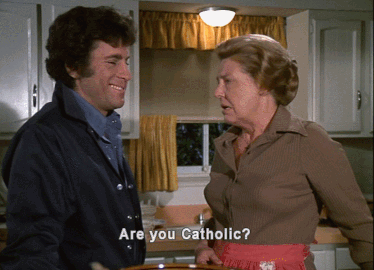
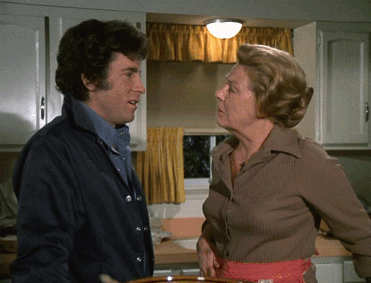
So I was looking at Starsky’s fanlore page and the discussion there talks about hints within the canon that Starsky may be Jewish. As one commentator notes, “There is plenty of mild justification for Starsky being Jewish”. Tbh, I’d say that, whilst subtle and never explicitly addressed, there is far more than just mild justification to suggest that Starsky is Jewish, and that he is in fact canonically so (and also I found the menorah they were talking about and I felt like I was on Myth-busters, which I’ve never seen but I imagine they mainly investigate fandom hearsay regarding background menorahs and other such suggestions. I’m insanely proud for having found it please appreciate because it took me a Very long time to, although I’ve found in researching this that there was at least one screenshot of it online here from 2011 :D).
TV Tropes has Starsky down for the Ambiguously Jewish trope and whilst I definitely agree that Starsky fits this trope description, I would say that there really is nothing ambiguous about it. There are just so so many aspects that come together. This boy is just canonically Jewish!
(Disclaimer: I’m not Jewish. Although I am very much considering converting and I’ve been studying everything I can about Judaism for well well over a year or so now, as well as attending services through whatever means I’ve been able to, I am by No Means even remotely close to being knowledgeable on the topic. Still, I figured there were some things I’d noticed whilst watching that hadn’t been mentioned that I wanted to bring up, and I also wanted to pull together observations by others into one place because I’m always hyped for canon representation and creating coherent resources. Extensive Research Is My Jam. If I’ve got anything wrong; said something in an uncomfortable way; talked where it wasn’t my place to talk; made assumptions I shouldn’t have; or like, said/done literally anything else that feels even slightly off then Please Please say and I’ll do everything I can to sort it!!)
Reasons why I reckon Starsky is canonically Jewish:
For one, Paul Michael Glaser is Jewish and if William Shatner being Jewish is good enough for my Jewish!Kirk headcanons then it’s sure as heck good enough for my Jewish!Starksy headcanons. Furthermore, according to Wikipedia, both Leonard Goldberg and Aaron Spelling are Jewish, and a good many of the writers have Jewish surnames too, though I can’t find out much about them specifically. Due to their fame, and therefore extended biographies, Wikipedia does specify that writers Michael Mann, and Fred Freiberger are Jewish. Joe Naar, who produced the show, was also Jewish, and used to joke that his style “was born out of being a short Jew with a huge chip on his shoulder.” Rick Edelstein was hugely involved in the writing of the later series and you can really see the influence Judaism has on his work, as is evident in his more recent short story, Bodega. He also ended his short video supporting Obama in '08 with "l'chaim, to life".
Essentially, I think Jewish people were involved in all levels of production within the show - from the writing, to the acting, to the direction, to the production - and this can be seen in the varied means by which it’s suggested that Starsky is Jewish himself. As such, suggestions that may have been seen as accidental otherwise can then take on greater significance, whilst the more explicit examples take on more emotional weight.
Why, then, would it not be more explicitly stated that Starsky is, and was always considered to be, Jewish? I read a really interesting post the other day about how Jewish people in Hollywood often felt unable to include Jewish characters/actors/themes in their work out of fear of seeming too “tribalistic, or insular, or that Hollywood was (as it was in the antisemitic imagination) a ‘Jewish’ front”. Obviously, I can’t comment from a Jewish perspective, but when I was younger I felt similar pressure in regards to including queer characters. As such, I think it’s really exciting to see the very explicit references to Starsky being Jewish, even if they aren’t clearly obvious to a wider audience not actively looking for such references.
Paul Michael Glaser also played Perchik in Fiddler on the Roof (1971) - which I mention not only because it shows Glaser playing other Jewish roles, but also as a recommendation because I Love My Hyped Wee Jewish Communist Revolutionary Boy. Glaser talked about how Starsky was a culmination of other characters he’d played prior to Starsky (DVD extras) and I think this is quite evident in Starsky and Perchik’s respective behaviours. As a nod to this, the middle top picture is (apparently) from a Jewish Labour Bund publication. This is something you can learn more about on its Wikipedia article here, and there’s more interesting things about The Bund here and here as well!
As we all know, Starsky calls Hutch the Blond Blintz (to his Puce Goose) :D Here’s a recipe for blintzes from myjewishlearning.com - they’re like pancakes and it’s an Ashkenazim custom to eat them on Shavuot. Also I love the scene in The Set-Up: part 1 where he first calls Hutch the Blond Blintz and Hutch is like???? and Starsky just says Blintz very definitively and with no further explanation and Hutch is just like,,, u kno what,, I’m just going to roll with this.)
I basically just really love this because it’s an example of Starsky being very openly and explicitly involved in Jewish culture, not just when he says it in The Set-Up, but also in Starsky’s Lady, when playing with the kids, especially as there aren’t a lot of references to things that carry on across multiple episodes.
I also like the way he pulls everyone else into his reference of it very un-apologetically; it feels very in character. There’s a picture of a blintz in the left column of the middle row! (Also, I feel like,,,, there might be some,,,, Freudian Implications to naming your partner after a rolled pancake filled with cream cheese that gets released when eaten?? @jimmyandthegiraffes fite me.)
Whilst Hutch looks at a glow in the dark cross being sold by Huggy in Jojo (written by Mann), Starsky picks up a mezuzah, which are put up at gateposts and door frames in Jewish homes - here’s a video about it :D The picture in the left-most bottom corner is Starsky inspecting this mezuzah. I really like this scene because he goes straight to it and seems to be considering it with very real interest. This is interestingly contrasted with Hutch picking up the cross, which isn’t the only time the show appears to draw a distinction between their respective cultural and religious heritages.
I think that really responds to some of the stuff William Blinn has said about their casting and how thrilled they were to have two actors playing characters from such different backgrounds whilst having such great chemistry, and how that really helps form the magic of the show even (DVD extras). I think their respective choices really help to demonstrate how assumed it was that Starsky Would naturally pick up a mezuzah, in contrast to Hutch’s cross.
The menorah (or actually Chanukkiah if we’re going to be really specific about it) in the background of Starsky’s apartment in Foxy Lady and in Blindfold. For so long I thought this was a myth but!! it’s not!!!! You can see it in the right hand column, middle row :D With the greatest thanks to the canon compendium for pointing out the episodes it appears in and also for like, literally everything else - it’s genuinely just the best fandom resource I’ve seen. I love this because I think, asides from a Magen David (Star of David), I think a menorah is one of the most well known symbols of Judaism and I think it’s really rad that it’s something the crew thought consciously to include, even if it is a largely not shown background detail. Again, it’s subtle but explicit which is why I would argue that Starsky is canonically Jewish.
It’s also worth remembering that even though it’s in an area in his apartment that doesn’t get shot by the cameras except on a few occasions, it Is a part of the apartment that’s Really visible from like, every direction and is right across from the front door. I’ve got another screenshot below from Blindfold that puts it more in context of where it is. I think this is really cool!! It’s obviously something he considers a big enough part of his life to keep on display year round and it’s something instantly recognisable and visible for anyone coming into his house (Foxy Lady came out on March 1st and Blindfold on October 21st, neither of which are around Chanukkah, if you’re going by episode air dates).
Speaking of the Magen David :D As can be seen in the episode Little Girl Lost, Starsky has a couple of blue six pointed stars on his dash under his Christmas decoration, as you can see in the top left hand corner of the mood board. I think this is really cool because Starsky is obviously very hyped for Christmas in this episode, hanging reindeer from his mirror and singing Christmas songs and being really hyped for presents, and this could be used to suggest that Oh No He Can’t Be Jewish He Likes Christmas, but not only does he only engage in secularised aspects of Christmas (in contrast to the nativity scene at Kiko’s house), there’s the very conscious inclusion of these stars. All the scenes in the car are set during Chanukkah, which ran from 16-24th December in 1976, and the stars are blue, which, along with white or silver, is often used for Chanukkah decorations and is traditionally associated with Judaism. Basically this remains in keeping with the subtle yet very conscious inclusion of Jewish symbolism, easily missed by those not thinking to look for it.
Also I know heaps of Jewish people that enjoy the secular aspects of Christmas, particularly if the holiday has meaning for their friends. In Starsky’s case this might be more because he wants to annoy Hutch and he likes bickering or perhaps because he’s upset by Hutch’s increasing cynicism and wants Hutch to feel happier. Or because he wants a new caboose for his train set. Probably that.
In the bottom left hand corner you’ll see a picture of Paul Muni, born Frederich Meshilem Meier Weisenfreund, Meshilem being his Hebrew name. I just like that Hutch suggests Starsky’s mother called him Rudolph Valentino and Starsky corrects him saying she “said I was more of the Paul Muni type”, suggesting the actor she compared him to was actually a notably Jewish one (Paul Muni references can be found in Lady Blue, as written by Mann, and Silence). Again, I think the contrast between Hutch suggesting a gentile actor, and Starsky raising a Jewish one instead is interesting, as well as highlighting Starsky’s mother’s engagement with, and perhaps predisposition towards, Jewish culture.
On it’s own this is perhaps more of a curiosity, maybe too much opportunity for coincidence to really warrant too much attention, but Dobey also chooses a Jewish comparison in The Velvet Jungle when he says, “who do you think you are, Starsky, Milton Berle?” So here we have two instances wherein the comparisons drawn with Starsky are with other Jewish personalities.
In Terror On The Docks (written by Freiberger), Huggy apologises for not bringing an ill Starsky chicken soup, instead bringing mustard green broth which, “where I come from is just as effective”. This might not have much significance in and of itself, except that literally just 2 episodes later, in Shootout, Sammy Grovner makes a joke about chicken soup being Jewish penicillin. In addition, Huggy’s reference to his own culture’s cure-all suggests that chicken soup would have been the culturally appropriate first-choice for Starsky. As such, I’ve included a picture of matzo-ball chicken soup in the top left hand corner.
Also, in The Game, Hutch says in regards to their soup related upbringings that, “we obviously had different mothers” and Starsky says, “yeah, mine was chicken soup, yours was,, clam chowder”, which isn’t really that important except that the show likes to highlight their different cultural upbringings and once again they’re doing so by referencing something that is widely culturally understood to be Jewish, having already explicitly stated it within the show to be so. (I could write a whole dissertation about cultural soup references in Starsky and Hutch, but I’m not going to. Just note that there are a weird amount of them.)
We see in Running that Starsky calls his mother every Friday evening. I think this is really interesting because, if they were both observant orthodox, they wouldn’t be using electricity on Shabbat. I mean, duh, Starsky is Not observantly orthodox but this scene shows that neither is his mother. Any yet, the time they’ve picked to talk each week is on Friday evenings, when many Jewish families come together for Shabbat dinner. As such, I think this shows how Starsky’s Judaism holds a place within his life and his routines, as well as suggesting what tradition he may have been brought up in. I personally headcanon conservative, but Reform works too!
As the fanlore page says, “Starsky looked stunned when Nancy's mother asked him if he were Catholic in 'Terror on the Docks,' to which he replied he was not.” This scene is a really interesting one to watch for this (and, again, was written by Freiberger), and whilst this merely shows that he’s not Catholic, his confusion and bafflement suggests just how surprising this question is to him, and his discomfort is evident as he laughs awkwardly. I think this is an experience many minorities can attest to, and he’s feeling the unease that comes when you’re put under pressure to reveal a part of your identity that may well be not received well.
In terms of the canon, I think the way in which this is played is so in line with the concept that Starsky is Jewish that it really suggests that this was something in clearly in mind in regards to his characterisation, at least by a number of the people working on the show.
In terms of headcanons, I like Starsky’s bewilderment here because it seems like he straight up just thought it was obvious that he was Jewish, and so it offers an in-universe explanation for why he never says “I’m Jewish”, rather than the external explanation regarding the fears surrounding creating explicitly clear Jewish characters in the 1970s.
It is interesting, in universe, that he doesn’t then say, “No, Mrs. Blake, I’m afraid I’m Jewish”, but I think this shows Starsky’s reticence to talk about his background with strangers, despite his comfort proudly talking about blintzes with Hutch and Terry. This is frankly just understandable, given the existence of antisemitism and Mrs Blake’s evangelical Catholicism, and again offers another explanation for why he never says I’m Jewish, wherein everyone he feels comfortable knowing already know, so there’s no need for him to say that.
(This said, @jimmyandthegiraffes and I headcanon that he just explains everything he doesn’t know with the fact he’s Jewish, even when it’s totally unrelated, *queue Starsky’s sage voice* “Ah see, I wouldn’t know whether those out of date eggs are safe to eat because I’m Jewish.” - Hutch is going to throw something. Also saying he can’t eat something healthy Hutch has made because it’s not kosher, whilst eating something obviously treif, which I made a post about here.)
We also see Starsky’s reticence to talk about his background with antagonistic strangers/suspects in The Committee, “Starsky? What is it, Polish?” “Something like that.” And yet, in Starsky And Hutch Are Guilty we see Starsky talk with Sharon, with whom he obviously feels comfortable with, about his home cooked goulash, “My mother gave me a recipe straight from the old country.” Again, this shows an in universe explanation for why we never see Starsky talk about his background explicitly, as those who he feels comfortable knowing already know.
This line is also interesting as it suggests information about Starsky’s heritage that pretty clearly implies a family with an immigrant background; this again would be in line with the experience of many Jewish people in the US, particularly when considering Starsky’s roots in New York as many families settled there fleeing pogroms and persecution. I headcanon that Starsky’s father was killed just after his 13th birthday (and his Bar Mitzvah) and moved to Bay City the summer after (this is taking Glaser’s birthday as Starsky’s for consistency).
This would mean Starsky lived in New York 1943-1956. The Jewish population of New York was at its peak in 1950 at 2 million. Still today, New York City is the largest community of Jews in the world within a city proper, including Tel Aviv. I think it perhaps goes without saying that this was and is particularly true in Brooklyn. I’ve seen lots of fics argue about where about in New York Starsky is from (with one claiming New Jersey which was pretty left field). The closest connection to New York that I have is that I grew up on the outskirts of the city it was named after. If you ever want to visit York, it has a lot of chocolate museums and a nice Gothic cathedral and a bad connection with Jewish history. I’m on a tangent. My point is, although I can figure Yorkshire accents, I’m not especially good at figuring out the nuances of New York accents so I leave it up to you lot, and on the whole people tend to suggest that he has a Brooklyn accent. We also know he has swum at Coney Island, and that the sea there tastes better than on the playboy island (Murder on Voodoo Island: part 2).
What we do know is that Starsky grew up on 84th Street (Targets Without A Badge: part 2) although there do seem to be a Lot of 84th streets in New York. We also know that if we are agreeing on Brooklyn then 84th street runs through Bay Ridge, Dyker Heights, and Bensonhurt. I figure Bensonhurst works best because, even though it’s a very Italian neighbourhood now, until the 50s it was a Jewish/Italian neighbourhood, which works with Starsky’s grandmother’s flat above the Italian restaurant (Shootout). It also works with the implications surrounding Starsky’s family and the mob (The Set-Up: part 1) as the Bath Avenue Crew operated in Bensonhurst. The mob thing is also interesting when considering Starsky’s Jewish heritage. There’s a painted Bensonhurst shop front in the bottom middle of the mood board which has been kept the same since the 1950s when Starsky could have been living there!
This has all been largely (or wholly) tangential, but essentially my point is that what we know of Starsky’s heritage chimes pretty neatly with the experience of many Jewish Americans, which again ties in with the argument that Starsky’s Judaism was something held in mind by those involved in the creation of the show.
Another thing I found interesting was in an article I was reading about Paul Simon, born less than two years before Glaser. In regard to Simon, Donald Fagen says, “There’s a certain kind of New York Jew, [...] almost a stereotype, really, to whom music and baseball are very important. I think it has to do with the parents. The parents are either immigrants or first-generation Americans who felt like outsiders, and assimilation was the key thought — they gravitated to black music and baseball looking for an alternative culture.” Simon responded to say that this wasn't too far from the truth. Obviously, Starsky enjoying baseball does not at all mean anything about him being Jewish, but it does fit in with his Jewish New York upbringing, from his father taking him to see the Yankees and him collecting baseball cards (Vendetta), to his enthusiasm with Pete (Little Girl Lost).
It is worth noting how this enthusiasm for baseball seems to be something that Starsky engages in far more than Hutch, which is interesting given Soul's history with the sport. (I feel like they definitely could have done more with the fact that David Soul was a good enough player to be offered a contract with the Chicago White Sox). Perhaps this wasn't pursued because a passion for baseball was thought to be more in line with Starsky's upbringing, versus Hutch's Sea Scouts. Again, this maybe suggests a certain narrative held in mind regarding Starsky’s background and how it influenced his characterisation.
Curiously, any Yiddish on the show is typically said by Hutch rather than by Starsky. In Vendetta, Hutch says to Artie Sorkin, “Fagin, faigeleh. What’s the differences? You’re vermin.” Faigeleh meaning homosexual. Also, as the canon compendium notes, “Hutch calls his houseplant ‘Meschugah Mantherlus.’” ‘Meschugah’ means crazy in Yiddish. “‘Mantherlus’ doesn’t translate as anything but is probably an inside joke and supposed to sound Latin.” (Ballad for a Blue Lady, co-written by Glaser.)
Largely I just found this interesting, but I did read a really cool study talking about the use of Yiddish in the American vernacular and one of its many findings was that gentiles with close Jewish friends were, unsurprisingly, more likely to use more Yiddish terminology. Also, unrelated but super fascinating, LGBT+ people were more likely to use Yiddish too.
On the Jewish immigrant experience, in Partners Starsky tries to get Hutch to play Pinochle with him, claiming "you love Pinochle", suggesting this is a game they frequently play together. Pinochle used to be a favourite card game of Jewish and Irish immigrants. I get that at this point I'm probably clasping at straws but I'm going for as comprehensive as possible, and I think it creates a good story about Starsky playing it with his family and later teaching it to Hutch.
It is interesting how Hutch is possibly shown to be engaging with Jewish culture in regard to both his use of Yiddish and his love of Pinochle. This may well be because Jewish culture permeates American society, after all it's Soul we see say the Yiddish "putz" in the bloopers. But it is slightly interesting that these were lines given to Hutch, perhaps for plot purposes, or because the writers were choosing to include their own culture and ways of speaking in a way that is safer through the evidently gentile Soul rather than the conspicuously Jewish Glaser.
There are other instances of Judaism in Starsky and Hutch that aren’t necessarily pointing to Starsky being Jewish but that are notable. Huggy Bear and the Turkey starts with Starsky and Hutch undercover in Caplan Laundry, where Hutch seems to be undercover as an orthodox Jewish man (and Starsky his wife? Seemingly? They certainly uh, go for it in the bloopers).
Caplan/Kaplan is a surname found in a number of cultures but it is a common Ashkenazim surname which also makes me headcanon Officer Minnie Kaplan as Jewish because we all want more Jewish headcanons in our lives and I think it puts her friendship with Starsky in an interesting context. (Marki Bey more like Marki Bae)
Again, it's Hutch we see taking on the more visibly Jewish role, although this does not go to negate Starsky's own Jewishness, as this may well be understood to be his influence on the friend he spends significantly more than 75% of his time with. Also, it can be assumed that Starsky is undercover as a Jewish woman as he appears to work at the launderette.
Obviously A Body Worth Guarding is the episode that deals most with Judaism as the Jewish protesters are a central plot feature. It’s interesting that Starsky’s involvement with them is largely hostile, however, I think this is more to do with the circumstances. At first he believes they’ve hired muscle to hurt Anna so he goes in hard which means the Jewish Organisation for Action respond with a more hostile approach. And yet, he’s completely on-board with dropping the JOA lead and following the fascist one as a result of Kauffman’s logic that attacking Anna would only lead to more antisemitism, which despite being a sound argument had no actual evidence to support it. From this point Kauffman is still resistant to working with Starsky which means Starsky maybe is more heavy handed in his approach, but it is on order to get Kauffman to help him follow the fascist lead. Once the job has been done he seems a lot softer towards the JOA and genuinely thankful for their help.
Essentially, the episode is noteworthy but Starsky’s reaction to the JOA tells us not so much about his own personal beliefs and upbringing and more about how he approaches his job. I do think it interesting that he believes Kauffman’s logic and subsequently drops all suspicion of the JOA and instead trusts him enough to bring him in as help.
Also Huggy calls the JOA the “desert people” which might just be Huggy’s turn of phrase but I think it feels more comfortable if Starsky is Jewish as it’s more like banter between friends then.
In spite of all these very purposeful allusions and references to Starsky’s Judaism, in Savage Sunday he complains about having to work on a Sunday, the Christian sabbath instead of Judaism’s Shabbat. And yet, I don’t believe this undermines Starsky’s Jewish presentation as it seems that his complaints are more that he expects to have Sunday off because he is in a Christian society which usually allows him a break on a Sunday to which he can look forward to. When he’s complaining about working on a Saturday in Jojo (written by Mann), Hutch says, “Could be worse, could be Sunday”, to which Starsky replies, “Come on, Saturday’s bad enough”, bemoaning all the sports that he could be watching instead.
This is interesting too as you could easily use this to headcanon him using sport as an excuse to express his frustrations at having to work on Shabbat, especially as it’s Hutch who says, “Could be worse, could be Sunday.”
Note: It was mentioned on the fanlore page that Huggy gives Starsky a wreath of garlic ‘for those of other persuasions’, but, as far as I can tell, the garlic is to ward off vampires of “all the rest of the denominations” when the cross for “any vampire of Christian persuasion” won’t be of help, rather than the garlic being for non-Christian vampire hunters. As always, I’m loving Huggy’s enterprising approach to religion, making sure he covers all bases, but it’s not really a suggestion that Starsky is Jewish, just that he needs to protect himself from non-Christian vampires.
In the same vein, Huggy does say “Shalom” to Starksy (and to Hutch) in Dandruff, though this seems to be more as an aspect of his undercover role as Prince Nairobi.
Essentially, Starsky is frequently presented as engaging with Jewish culture, practices, and traditions, often very visibly so. Aside from the very explicitly Jewish references, Starsky is very frequently characterised in a way that suggests his being Jewish was held in mind, on a writing level, an acting level, a direction level, and a production level. As I mentioned earlier, American society in imbued with Jewish culture and so many of these things may have been purely incidental. However, coupled with the more explicit examples of Starsky's Judaism they may be said to take on greater purpose and subsequent significance. Pretty much across the board, he is understood to be Jewish and whilst these references maybe subtle enough to pass by those not engaged with Judaism or considering it a possibility, this does not preclude Starsky’s Judaism from being a very knowing and explicit inclusion, and therefore canon.
Given all this, I have some headcanons about to what extent Starsky is practising!
We canonically know he doesn’t keep kosher – I mean this boy eats linguine with clams. I have read a fic where Hutch is forbidden from telling Starsky’s ma that he eats bacon or meat with dairy and I really like this as a headcanon. I definitely think she Knows but she lets Starsky pretend he doesn’t because it keeps him happy.
We also know neither he nor his mother have qualms about not being shomer Shabbos, but as I mentioned earlier, we Do see them using Friday evenings as the time they choose to call one another.
We know he doesn’t wear a kippah on the regular, too. And he never says the Sh’ma out loud if he thinks he’s about to die, although I do think he probably says it to himself. Again, I think I’ve read a fic about that. As I reread the ones I have bookmarked I’ll add them in if I can find them.
Other than these examples, pretty much everything else as far as I can tell is fair game, particularly if you’re considering along the lines of Reform, or even conservative, depending on the community. I know a lot of Jewish people who would consider themselves to be actively practicing who don’t keep kosher or who work on a Saturday etc.
About that, as I mentioned above, we know he does sometimes work on a Saturday (and he complains about it). This suggests that he doesn’t necessarily frequent synagogue regularly, particularly as he was frustrated about missing the sport he likes to watch on a Saturday.
However, for one thing, this doesn’t mean he Never goes to temple, and for another, we do know that Starsky very likely celebrates Chanukkah, due to his Chanukkiah. Chanukkah is a relatively minor Jewish holiday and so if he celebrates this it’s likely he also celebrates other, more significant holidays, and high holy days. Maybe he doesn’t go to shul every week, but a synagogue on Yom Kippur is generally full of people who are not regular attenders.
Please imagine this boy trying to fast I bet Hutch would be glad as hell that Starsky isn’t at work lol.
Personally, I tend to headcanon that Starsky moves to greater observance post Sweet Revenge. I think the hospital rabbi is good at playing Pinochle and the two become friends and they have good philosophical debates and Hutch joins in and after Starsky is discharged they want to see the rabbi so they start regularly attending shul and they both find something they can get out of it, especially as I headcanon that they retire from the force I think it gives them a community. For Starsky, I think it gives him a connection to his heritage and his family and maybe his father in particular, as well as a focus on social justice work through the synagogue so that he and Hutch can still feel like they’re making a difference. Tbh, I think that Hutch might find a lot to connect to in Judaism, maybe in the way it’s focused on making a difference in the here and now and not in order to access some afterlife. To be clear, I don’t think that’s necessarily the angle Christianity takes but I think it is how Hutch might perceive it and I think he might find Judaism more grounding in that respect. Also, if he converts then Starsky’s ma would be thrilled that if he hasn’t found a nice Jewish girl then at least he’s found a nice Jewish boy and Starsky will tease that Hutch’s hair is so long he might as well be a girl. I think it would create a really interesting relationship between Starsky’s ma and Hutch where they talk about Judaism and she introduces him to recipes and books and stuff and later Hutch is showing Starsky and he’s like, how come Ma never showed me?! And Hutch is like, she tried to idiot you just got distracted. And they can just, explore stuff together. It’s really soft.
Also, I think they host Shabbat dinners every Friday and it’s really cool because it’s a way that they can stay in touch with the Dobeys after they’ve left the force, and how they can stay close with Huggy when they’re not visiting for tips every other day. Also Kiko and Pete can come and then stay the night and spend Saturday with them maybe to give Mrs. Ramos a break. Minnie can come too and say the prayers!! Plus Paco Ortega and Joey and tbh any number of the other kids they’ve accidentally adopted over the years.
Pesach at theirs is just, the fullest house you can possibly imagine I love it. @jimmyandthegiraffes came up with the idea that there isn’t space for Dobey and the boys are like, oh you’re sat on the counter and he’s like? But there’s an empty chair and place set out here?? And he goes to sit down and everyone is like, nOOoO that’s for Elijah!! You cAnt sIT in Elijah’S plaCe?!
Gosh I love them
Starsky high key calls the new year “secular Rosh Hashanah”
Even though I personally headcanon a greater observance after sweet revenge, there really is nothing at all to say he isn’t at least somewhat practising over the course of the series and even that he is, given the Chanukkiah and what that means about holidays. I like how he keeps it up year round to maybe keep in mind his faith/upbringing/background.
I think it’s interesting that many of the fics that engage with Starsky as Jewish often suggest that he’s not religious, which is of course completely possible. However, just because he doesn’t ever talk about a faith in God doesn’t mean it isn’t present, especially when faith is often something so private and proselytising isn’t a part of Judaism. Personally I think that Starsky does have faith in God throughout the series and after, and this does impact his relationship with Judaism prior to Sweet Revenge as he considers things like the mezuzah and engages with Jewish culture, but that it’s after Sweet Revenge that he starts engaging with his faith more as connected to Judaism and religious traditions, rather than I’m going to celebrate my culture and upbringing and also I have a faith in God. He sees the two as more connected perhaps? and his faith as having a more direct impact on his life.
I really like how Huggy says the thing about the chicken soup too, and the “desert people” line is made a lot sweeter by thinking of him as a cool supportive friend who Starsky has known for a long time and who typically engages with Judaism specifically because it means something to Starsky.
I seemingly have a lot of thoughts on this.
Also, I really like how he calls him blintz, weird Freudian implications aside, especially because blintzes can be eaten at any time but are typically associated with Shavuot and I like the idea that Starsky has really a really fond association with his religion but also with Hutch. I really like the idea that if Hutch converts then the two can stay up all night together, eating blintzes and cheese and Hutch can maybe read aloud for my dyslexic boy.
Essentially, I just really love thinking about this and I think there’s more space for an actively practising Starsky than there’s generally understood to be, religious or not, even over the course of the show. Especially if you consider Reform Judaism. But tbh just give me Jewish!Starsky fics and I’m happy whatever they’re like.
I’ve worked really hard to find each scene I’ve mentioned on my DVDs (this post has taken me literally So Long to write (9 months-ish? it’s my Child) and I’ve researched it far Far more than I do my uni assignments whoops), so you can be sure I’ve checked to make sure each reference is legitimate. If you want to see screenshots of these quotations, or you want to know whereabouts in the episodes they occur, then message me! If you have additional examples or you disagree with me or if you’ve spotted a mistake then share that too!
With all my thanks to my partner Chester who’s put up with me banging on about this and spending Hours and Hours being ridiculously pedantic in the hopes of creating as coherent a resource as I can. They’ve also contributed so much and just they’re rad. I also cannot thank enough the canon compendium for helping me fill in all the blanks and pointing me in all the directions I needed to go in, I Genuinely cannot think of a better fandom resource. Also the first 3 seasons scripts are available here which is a huge help.
tldr; Starsky is irrefutably, canonically Jewish and also I love him
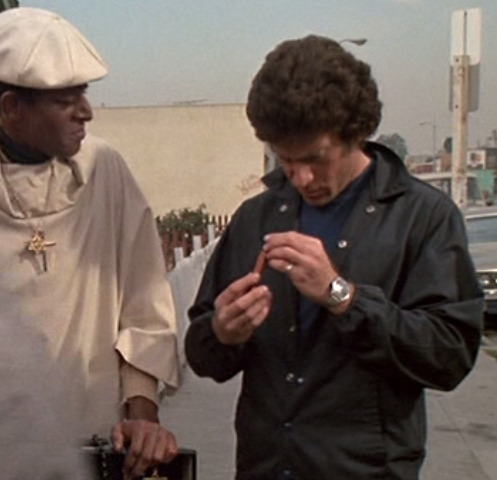
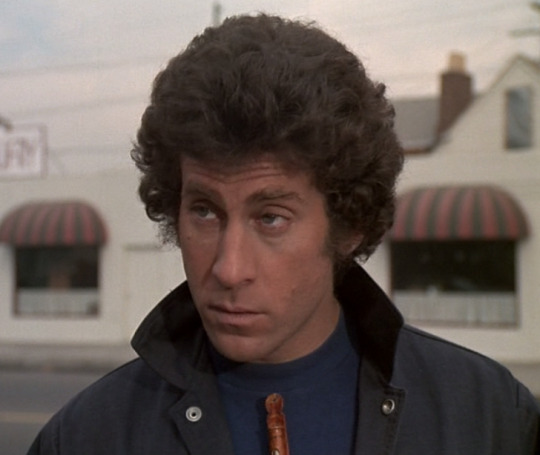
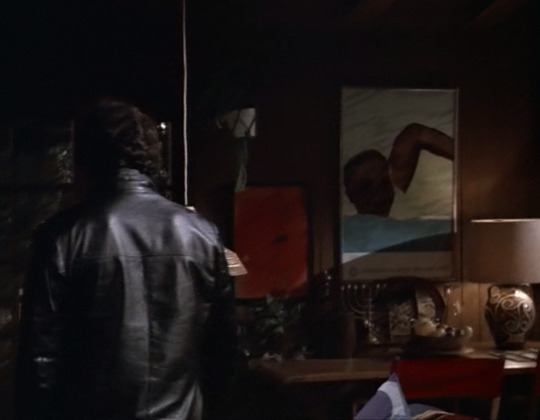
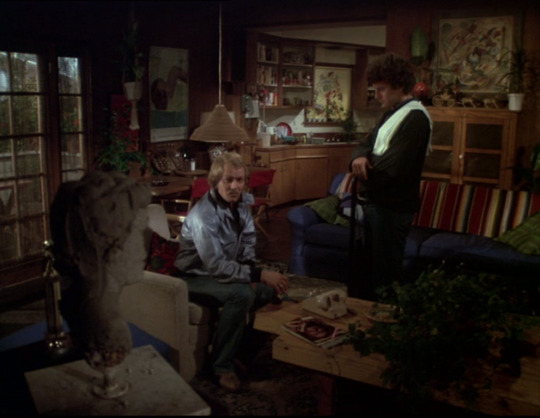
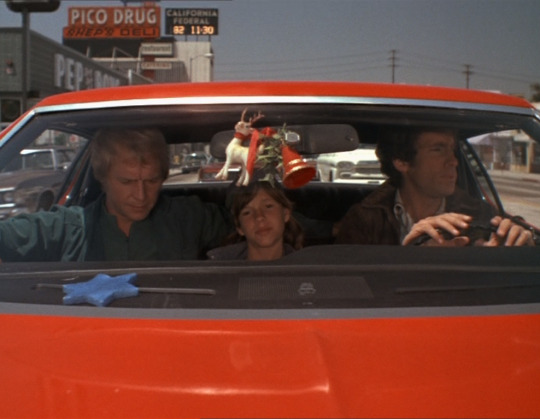
#starsky and hutch#starsky#david starsky#dave starsky#a jewish boy#this took like#9 months#starsky is jewish#this is over 6000 words whoops#my posts
89 notes
·
View notes
Text
Awakenings
For some reason, I’ve always been drawn to Rip Van Winkle-style stories about people who fall asleep for one or many years and then wake up to find themselves in whole new worlds. First of all, there’s Rip himself—a fictional character who first made his appearance in Washington Irving’s collection of stories and essays, The Sketch Book of Geoffrey Crayon, Gent., which came out exactly 200 years ago in 1819. The book has long since been forgotten by most, as unfortunately also has been its author: one of the true giants of American literature in his day, Irving has for some reason not joined the authors he himself encouraged in their careers—writers like Herman Melville, Nathaniel Hawthorne, Edgar Allan Poe, or Henry Wadsworth Longfellow—in the pantheon of American authors still read other than by people to whom their books have been assigned in American Literature classes. And he really was one of the greats! I believe that I’ve read all his stories, certainly most of them, and “Rip Van Winkle” is one of my favorites. His other still-famous story, “The Legend of Sleepy Hollow,” turned into a whole series of Hollywood movies—most memorably Tim Burton’s 1999 film, Sleepy Hollow—and television shows, is also a terrific piece of writing that deserves to be more widely read in its original format. But I digress: I wanted to write here about Rip van Winkle himself and not the author who dreamed him up.
The story is well known and easily retold. One day while wandering deep in the woods near Sleepy Hollow to escape his wife’s endless nagging, Rip runs into the ghosts of the sailors who in their day manned Henry Hudson’s ship, the Half Moon, and promptly joins them in a game of nine pins and in drinking a lot of liquor, whereupon he falls into a deep sleep. Then, when he awakens twenty years later, he discovers that his son is now a grown man, his wife has died, and that he missed the entire American Revolution while he slumbered away. He makes his peace with being a widower easily enough (the Van Winkles don’t seem to have had too happy a marriage), finds it more challenging to abandon his native allegiance to King George, and finally ends up settling in with his grown daughter as he tries to figure out the new world and his place in it.

There are lots of parallel stories to Irving’s tale. Third-century (C.E.) Greek philosopher Diogenes Laëterius, for example, wrote about a man named Epimenides who fell asleep for fifty-seven years and then had to negotiate an entirely new world when he awakened. Jewish literature has its own version of both Rip van Winkle and Epimenides in Honi the Circle-Drawer, a wonder-working rabbi of the first century (or thereabouts) who fell asleep for seventy years and awakened to find a man tending to carob trees that Honi himself had witnessed the man’s grandfather planting just (it must have felt like) a day earlier. Other cultures have their own versions, but what makes them appealing—and also slightly terrifying— is the fantasy that this could possibly happen to us readers, that we too could possibly get into bed tonight, turn off the light, drift off into sleep…and then awaken not tomorrow morning but a century from now. Nor is it hard to explain why this is such an arresting theme to so many. We all like to think that the world is so sturdy, so substantial, so there, after all…and then an idea like this takes root and suggests that it’s all a chimera, all a fantasy, all an elaborate illusion played out against an equally illusory dreamscape, that what feels so real is only an elaborate set that the stage crew will take down the moment we breathe our last. And why shouldn’t the theater of life mimic the way things work in real theaters? The show closes, the crew strikes the set, the actors return their costumes, and everybody goes home. And, on Broadway, that is that!
And now it turns out that it really is so that people fall asleep and awaken decades later. Some readers may have noticed a story in the paper a while back about one Munira Abdulla, a woman from a small town in the United Arab Emirates, who was in a terrible automobile accident in 1991 when she was only thirty-two years old. She fell into a coma, but was kept alive by her family in the hope that she might one day awaken. And she did just that, awakening, apparently on her own, after twenty-seven years. Technically speaking, Ms. Abdulla was in the state technically called “minimal consciousness,” which is less bad than being in a full coma (i.e., in which the patient shows no sign of being awake) or in what’s called a persistent vegetative state (in which the patient appears to be awake but shows no signs of awareness). It is, however, still extraordinarily rare for patients possessed of minimal consciousness simply to awaken.
It’s happened closer to home as well. Terry Wallis, for example, was nineteen when his pickup skidded off a bridge near his hometown in Arkansas, which accident left him in a persistent vegetative state. Doctors told his family that he had no chance of recovery. But then he somehow managed to move up a notch into the same state of minimal consciousness that Munira Abdulla was in. And there he remained for nineteen years, domiciled at a nursing home near his parents’ home. And then one day in 2006 his mother walked into his room, whereupon he looked up and said “Mom” out loud, the first word he had uttered in almost two decades.
Donald Herbert’s is a similar story. A Buffalo fire-fighter, Herbert was injured on the job in 1995 when debris in a burning building fell on him and left him in what doctors called a state of “faint consciousness” for a full decade. And then, in 2005, after a full decade of silence, he opened his eyes one day and asked for his wife.
These are rare stories, obviously. Most comatose people—including people possessed of faint or minimal consciousness—do not suddenly wake up and start talking. Indeed, in every real sense, these people I’ve been writing about are the rare exceptions to an otherwise sad rule. But the fact that such people exist at all is very meaningful: even if the overwhelming majority of comatose patients do not spontaneously wake up, some apparently do. And in that thought inheres the huge problem for society of how to relate to the somewhere between 100,000 and 200,000 Americans who exist in states of partial, faint, or minimal consciousness. Most will never recover. But some few may.
Many readers will remember Penny Marshall’s terrific 1990 movie, Awakenings, starring Robert De Niro and Robin Williams, and based on Oliver Sacks’ 1973 book of the same title. (Less well known is that Harold Pinter wrote a short play, A Kind of Alaska, based on Sacks’ book as well, which is often performed as part of a trilogy of the playwright’s one-act plays.) The story of the book and the movie (and presumably the play as well, which I’d like to see one day) is simple enough: a doctor working in 1969 at a public hospital in the Bronx is charged with caring for a ward of catatonic patients who survived the world-wide epidemic of encephalitis (specifically the version called encephalitis lethargica) in the 1920’s. The doctor, very movingly and effectively portrayed by the late Robin Williams, somehow has the idea to try using L-Dopa, a drug used to treat Parkinson’s Disease, on these patients and gets astounding results; the movie is basically about one of those patients, portrayed by Robert De Niro, whose “awakening” is depicted in detail. It doesn’t work in the long run, though; each “awakened” patient, including the one played by De Niro, eventually returns to catatonia no matter how high a dose of L-Dopa any is given. The movie thus ends both hopefully and tragically: the former because these people on whom the world had long-since given up were given a final act in the course of which they sampled, Rip Van Winkle-style, the world a half-century after they fell asleep; and the latter because, in the end, the experiment failed and no one was cured in anything like a long-term or fully meaningful way.
Why do these stories exert such a strong effect on me? It’s not that easy for me to say, but if I had to hazard a guess, I think I’d say that the concept of dying to the world briefly and then coming back to life to see what happened while you were gone is what draws me in. (Fans of Mark Twain will recall Tom Sawyer’s wish to be “dead temporarily.” But even Tom and Huck only manage to be gone from the world long enough to attend their own funeral and enjoy the eulogies they hear praising them, not to vanish for decades and then come back to life.) I’m sure there would be surprises if I were to go to bed tonight and wake up in 2089. Some would be amusing—seeing what model iPhone they’ve gotten up to or what version of Windows, or if anyone even remembers either—and some would be amazing: if the President of the United States in 2089 is sixty years old, then he or she won’t have been born yet. But mostly it would be chastening, and in the extreme, to see how all the various things that seem so immutable, so permanent, so rooted in reality in our world, have all vanished from the world, as will probably also have all of the houses in which we live today, the banks in which we store our cash, and even the shore lines that mark the boundary between the wine-dark sea and the dry land upon which we live in safety or think we do. Depending on a wide variety of factors, that thought is either depressing or exhilarating. But in either event, it makes it easier not to sweat the small stuff or allow our own anxieties to impact negatively on the pleasures life can offer to the living.
I will bring all these thoughts with me as I prepare for Israel in a few weeks’ time because the Rip Van Winkle and Terry Wallis stories are Jerusalem’s own as well. The vibrant center of Jewish life for more than a millennium when the Temple was destroyed in the first century, the city was suddenly emptied of its Jews by its Roman overlords who renamed it and forbade Jews from living there. And yet…some small remnant always remained in place while the city slept. And then, just when the Jewish Jerusalem’s faint consciousness seemed poised to flicker and die out entirely…just the opposite happened as Jews from all over the world built a new city on the outskirts of the old one and breathed consciousness and life itself into its ancient alleys and byways. As the patient came back to life, she didn’t only re-enter history either—she began to be a player in her own story, stepping off the stage to become her own play’s playwright and director. It felt like a miracle then and it feels like one to me today too.
When I’m in Jerusalem, I myself feel my consciousness expanding and becoming in equal parts rejuvenated, reconstituted, and revivified. I never run out of things to do, to write, to read, to experience. I can’t imagine being bored in Jerusalem, even on a hot day in mid-summer when I could just as easily be on the beach in Tel Aviv. I love the beach! But there is something about the air in Jerusalem, and the light, that is the spiritual version of L-Dopa that Robin Williams gives his patients in Penny Marshall’s movie. Except that it doesn’t wear off with time and, if anything, only gets stronger and more powerful as the weeks I spend in Jerusalem pass one by one until the time comes to come home and begin a new year in this place we have all settled.

2 notes
·
View notes
Text

★ ━ ( grant gustin, cis male , he/him ) ━ ★ the other day i ran into ELIJAH ROBERT MORRIS and GOOD DAY by DNCE got stuck in my head immediately after. it’s funny that song reminded me of the THIRTY YEAR OLD, because i was just thinking about how their birthday was on JANUARY 1ST and how they’ve been living in RICHMOND for EIGHT MONTHS and working as a VOICE ACTOR, WRITER FOR ADULT SWIM, & STAND-UP COMEDIAN in all the time i’ve known him, ELI, has always seemed to be DEEPLY CARING, OPEN-MINDED and LIVELY, but did you know he could also be PETTY, CHILDISH, and NEEDY?
This is Elijah. He goes by Eli or Dickwad, whichever one you feel first. I’m kidding call him Eli. He’s a chill guy, very charismatic… definitely used to be a drug dealer in college, he has since stopped that. Now he’s just a guy who has weed n the form of edibles for medical purposes which is legal in Portland and sometimes his own Adderall, that he has for his ADHD. But point is if you’re in his house don’t eat any candy without checking with him first, cause you’ll probs end up high af.
He has a twin brother named Matthew. They’re close. He moved to Portland to reign in his younger half-sister Jenni, they’re not as close. Eli and Matthew’s parents ran a meth lab up and both exposed to it until they turned three and their dad went to jail for armed robbery and alleged attempt at murder cause that was ya know a smart thing to do so their mom made the one respocible decision she's ever made with them and dropped baby Eli and baby Matthew off with their Dad’s adopted sister, Jessica, and she became their guardian and raised them along with her own son Christopher.
It was only about a week with their aunt and a ton of crying that she took them to the hospital after a bit and they discovered Eli and Matthew were in detox from the meth that had been in their systems. Miraculously Matthew ended up fine. Eli on the other hand developed a heart condition and has always had a lot of health issues and surgeries ever since. So to say his relationship with his parents is kind of fucked up is an understatement tbh.
so aside from that, quick things about Elijah.
He’s a Florida boy straight outta Miami and for sometime Jacksonville. Go Gators.
Has a slight southern accent that he represses literally as much as possible cause he kinda hates it tbh.
Liberal as fuck.
Feminist as fuck.
Jewish as fuck.
Bisexual as fuck.
Was once in a polyamorous relationship with 2 dudes.
Clearly, that didn’t work out cause he’s single.
He's attracted to chaos in people.
Very rare that he actually dates someone who's "normal" usually dates crazy people or people with oddities.
Has stories like being stabbed by a girl he was dating after finding out she was a furry. another girl bringing a dead fish with it's own fish coffin on their first date. a girl who put a used tampon in his coffee when he tried to break up with her, ect.
Kind of vain.
& an idiot.
cracks lame jokes.
Very loyal.
Great listener to people he feels are worth listening to otherwise, BYE.
Is a dick for no reason when he feels like it.
likes to fuck with people
and fuck people
Once a hoe, Always a hoe.
He’s a smartass, but lbr who isn’t right?
Sarcastic. again who isn’t?
Went to Princeton.
Speaks 6 languages
Fluent in English, Italian, Hebrew, & French.
Knows enough Spanish & German to understand it when someone is speaking it, but can just get by in a conversation.
Childish as fuck.
Petty as fuck.
Competitive as fuck.
Stand-Up Comedian
His jokes are based mostly on his life and the crazy people he has dated and the many many odd jobs he's had but is always respectful. Never talks shit about women in his act ever. has only ever once in his life called a woman a bitch and it’s because she screwed him over in a terrible terrible way.
Voice actor for Cartoon Network & a writer for a few Adult Swim shows.
I think that’s it.
Yup, that’s it.
2 notes
·
View notes